#and if japanese or japanese american fans come along and say that might be wrong
Text
can't believe the whole yuichi usagi side of the tmnt fandom is synchonizing this week bc guess what; I also have another "Usagi is his first name" post in the works lol
#anyway. what's up fandom#srtuc#yuichi usagi#not up for discourse or debate but we can discuss it in a calm way#i've seen way too many confused and angry twt threads abt this and then the tumblr reblog threads... augh#not a big deal but i will adress some of it in larger writing i guess#in general tho imo fans should refer to both the og work and it's intent#and if japanese or japanese american fans come along and say that might be wrong#so be it#texty#aghht fantalk#the usagi name debacle#that was my tag at some point and it will continue to be lol
6 notes
·
View notes
Text
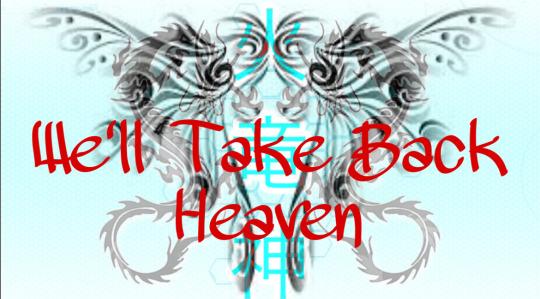
We’ll Take Back Heaven a Nalu Yakuza Au
1 | 2 | 3 | 4
“Ms. Heartfilia,” the man nodded at the blonde.
“Mr. Katsunuma.” Lucy bowed in response. “Thank you for inviting me.”
“Of course,” the older male smiled. “Your assistance has led to this celebration after all.”
It was an extravagant party being held in a large room of Katsunuma Industries corporate headquarters. The tech giant was celebrating the acquisition of their rival in the industry… thanks in part to Lucy’s untraceable services. A few bits of intelligence on the rival company coupled by the money laundering Lucy provided allowed Katsunuma to fuel the merger and overtake them. The rival had no choice but to sign the contract because if they didn’t, they would have been put out of business. Part of the deal insured the employees would be kept which had been the rivals concern, but those employees are in large part Katsunuma’s desire to take the business. Their current patents and information aside, those employees were the heart of creating more. It was a genius move.
“Mmm, I do what I can,” Lucy smiled sweetly and held up her glass. “A toast to a successful relationship.”
The man clinked his glass against hers. “For many more years to come. Enjoy the party, Ms. Heartfilia.”
“I will,” Lucy responded with another smile.
As she made her way back towards the temporary bar set up, Lucy chatted with people along the way. Some she knew, others she didn’t, but her stunning looks always turned heads everywhere she went. She wasn’t the typical Asian beauty found around those parts. Her mother was a Caucasian American and her father a Japanese businessman, so the hapa mix created a buxom blonde with almond eyes and legs for days, fluent in both English and Japanese as well as Korean. Gorgeous and intelligent. Men desired her, and women either hated her or wanted to be her. Luckily for the other women, Lucy had no interest in these stuffy, boring business types, except in taking their money because she knew all they wanted were docile arm candies and that wasn’t for her at all.
The only reason she attended these events were to show her loyalties and drum up new business considering she operated at word of mouth. But anyone too eager to do business with her immediately sent up a cautionary flag. No one survives in the dark world by being naive, the biggest lesson her cut-throat businessman of a father ever taught her. Lucy had to get to know the person, feel them out, and background check them inside and out, and even after all that she wouldn’t immediately jump into an arrangement. She made sure that any business wanting to employ her laundering services would lose big time if they ever considered turning on her. ‘Stupid men,’ she mused to herself. Greed was the easiest way to keep them in line, because the green-eyed monster was just too enticing. Another lesson her father taught her the hard way when bankrupted his company on a bad venture.
Lucy placed her empty glass onto the bar top and rested an arm on it. She smiled at the orange-haired bartender. Handsome in a playboy kind of way, even the glasses added to the charm. “A Cosmopolitan, please.”
“Coming right up cutie,” the man winked at her.
She wanted to roll her eyes but played it cool. “Loke, is it,” Lucy read off the name tag on his vest. “Unusual name. Bet you flirt with all the girls, huh?”
“Only the pretty ones,” he grinned back. “And you are the finest example here tonight.”
“Aww, how sweet,” Lucy clicked her tongue with a shrug. “Too bad lines don’t work on me.”
“Doesn’t surprise me,” Loke smiled back undeterred. “You’re definitely a higher caliber than the rest.”
‘Oh, Kami,’ Lucy droned internally. This guy probably had a ton of cheeky comebacks in his repertoire. Was he fuckable in her view? Toned body but not too muscular, nimble fingers… maybe fit for a one-night affair. It has been awhile since she’d had some action, so maybe he could be fun to end this celebration with. She leaned in closer letting her breasts press up against the counter. “You know this might—”
“Careful dude, this ones got claws you don’t wanna mess with.”
Lucy’s body stiffened in annoyance at the new voice so close to her ear. “Ugh, Natsu.” Not the intrusion she wanted right now!
“My apologies,” Loke immediately put her finished drink down, then his hands up as he took a step back. “You have a good evening ma’am.”
But the bartender’s body language spoke volumes as well. Loke wasn’t reacting solely to the comment, because he was staring straight at Natsu as he spoke. She could imagine that while Natsu’s tone was light, he was probably giving the bartender a menacing glare. Ugh!
Annoyed at Natsu’s interjection, Lucy grabbed her drink in a huff and started to walk away without looking behind her. “I don’t need a knight,” she huffed. But undeterred, Natsu immediately stepped in and tried to weave an arm around her waist. “Don’t get familiar,” she seethed in a hushed tone as she stepped out of his embrace. She didn’t want to cause a scene either, so she pulled him away from the crowd near the bar area to a quieter section. “What do you want Dragneel?”
“It’s improper for a woman like you to be without an escort at these events.”
Lucy placed a hand on her cocked hip in irritation. So, what if that were true, those traditions made her skin crawl. She normally would have brought one, but her go-to guy wasn’t available and since most of the guests knew who she was, Lucy figured they wouldn’t care. Why would a bunch of old guys not want a gorgeous blonde to look at? “I’m perfectly fine by myself considering I’m an invited guest. What are you doing here, this isn’t your playground.” She knew the world of corporate Tokyo and business stiffs were not the type he’d associate with. Though she had to unconsciously admit Natsu looked good in a three-piece suit.
“Be nice kitten, I was invited too.”
“Oh yeah, by who? I know Katsunuma’s not involved with the Yakuza.”
“Not senior, the son. Boy’s got a bit of a habit along with his friends.”
“Ah, let me guess, you’re the supplier.”
“You guessed right, kitten.”
“Stop calling me kitten!”
The irritation in her voice only succeeded in pulling a smirk from Natsu. He was obviously enjoying this dance, which fueled Lucy’s determination to not be swayed by it. She took a sip of her drink in annoyance. “Shouldn’t you check on your client then?”
“What for? Those rich brats partying on daddy’s dime make for disinteresting conversation. I’d much rather talk to you.”
“Lucky me,” Lucy rolled her eyes. “Well, I’d rather schmooze with my clientele. They serve a purpose, you do not.”
Natsu reached out and ran a finger along Lucy’s arm. “So harsh, kitten. We both know you’re enjoying this too.”
The ripple he triggered along her skin and increase in temperature had Lucy internally reeling, though the dead stare she wore on her face showed the opposite reaction. She wasn’t about to admit to a damn thing! “Uh-huh, keep telling yourself that Dragneel. Perhaps one day your dreams will come true.”
“I’m counting on it.”
“Ugh!” Lucy pushed him away in annoyance. “You’re too much! I’m leaving.” She turned her back.
“Oi,” Natsu grabbed her arm forcefully and spun her back around. “I mean it!” he growled in a lowered voice. “You may be damn good at what you do, but you still got a thing or two to learn about a man’s world.”
“What the fuck are you talking about,” Lucy spat back in a hushed tone. “These guys don’t care!”
“You think they’d say it to your face, kitten? I’d overheard more than one of your so-called prospects here gossiping about your shameful behavior and you’ve only been here fifteen minutes.”
“You’re lying.”
His eyes narrowed and brows furrowed. “I’m a lot of things, but you know I wouldn’t lie to you.”
Okay, so that was true. Lucy’s known Natsu long enough to know when and if he’d ever lie to her. Still, “fine!” She seethed. “I won’t plan on staying much longer if I’m stuck with you.”
“Aww,” he defiantly tipped her chin up. “But I’ll take such good care of you.”
“Pfft,” she glared back with a twisted smile and voice dripping with sarcastic disdain. “As if. You couldn’t satisfy me then, so… what makes you think you could now?”
“Wow…” Natsu placed a hand over his heart feigning pains and groaning for effect. “Hitting me where it hurts, Luce.” He then grinned and suddenly pulled her flush against his solid body, arm wrapped around her waist, while the other gripped tightly to her hip so she couldn’t move. He leaned in, his face lowered and hovering over her ear. “If only it were true. All those nights… I lost track of how many times you called my name to the heavens.”
Between the sensually deep tone of Natsu’s voice and warm breath fanning over her skin, Lucy couldn’t hide her physiological reactions if she’d tried. Her body stiffened up, fighting a hormonal urge to give in with a sheer determination not to play his game. There was a damn good reason they’d broken up, and until he admitted to what went wrong, there was no way in hell Lucy would go back to him.
“It’s not just about sex,” she gritted out.
“I know…” Natsu let his lips brush against her ear, pulling a shiver from her body. He smirked. “It’s about love.”
Love?! How dare he! Whatever spell he was close to casting instantly dissolved on Lucy and her anger boiled to the surface. She pushed with all of her might, forcing them apart. Oh, she was furious! “And that’s something you know nothing about!” Lucy’s hand flew up faster than even she knew it was happening, landing a loud slap across Natsu’s face. “You made your choice long ago, and love never factored in,” she seethed then stomped away leaving the man alone and speechless amongst whispering bystanders.
So much for celebrating, not after Natsu’s intrusion into the affair. Lucy thanked Katsunuma again for inviting her and left the party. She couldn’t be around Natsu for another second or she just might hit him again. Ugh! He made her so angry! Love… seriously?! He had no right to pull that on her, not when it was his decision that lead to their split. In a way she should thank him for opening her eyes, because that’s what lead to creating her own organization. Lucy wanted to show that women could do just fine in the underworld with the right people and the right plans in place. And she hadn’t been the only one to feel that way. This was the modern era and all the bullshit, patriarchy rules that held them back needed to die with the twentieth century. The saddest part… Lucy didn’t even know if Natsu realized how much he’d hurt her all those years ago.
“Ma’am,” the valet snapped Lucy out of her thoughts. “Your car has arrived.”
“Thank you.” Lucy stepped closer to the curb as the vehicle pulled up alongside her. The valet opened the door for her, but just as she was about to step in, she heard her name called from behind her.
“Natsu, can’t you take a hint!” She turned and snapped while still keeping a hand on the vehicle.
“Luce, I was just playing with you upstairs. I didn’t mean to make you so angry.”
“Well, you did.”
“I don’t understand why!”
“And that’s your problem.”
“But I don’t want you to hate me, and you seem to hate me.”
Lucy sighed from the sheer emotional exhaustion. “I don’t hate you, Natsu. But until you can figure out why I left you, we don’t have anything more to talk about. Now. Good night.” She got into the vehicle, and they drove away.
Once they were out of sight, Lucy slumped down into the seat holding back the cloud of tears building in her eyes. She’d meant what she said, all of it including not hating him. Frankly, she didn’t know if she could. Anger, yes, but hatred no. They’d been young but even she recognized the connection she had to Natsu wasn’t something she could easily walk away from, and she also knew he wasn’t lying when he’d brought up love. The man’s reaction to seeing her flirt with the bartender was a reminder of his feelings for her. But it wasn’t enough. Lucy didn’t want to feel like an unequal partner in the relationship and that’s exactly what the Yakuza world Natsu chose expected.
“Home, miss?”
“Yes, please take me home.”
#nalu#nalu au#nalu fan fic#nalu fan fiction#Natsu dragneel#Lucy heartfilia#yakuza au#modern yakuza#rivalry#Natsu x lucy#we'll take back heaven#ch 3#petri808
32 notes
·
View notes
Note
I have a another question about localization since you say all of the FE localizations are good but then there's the localization I hear about of FE fates a localize game that I hear so many Nintendo and FE fans say really bad things about it such as a lot of Mistranslations, Big Script changes, Memes being add in, etc also there was some censorship that got some of them really mad and with some of them saying that it's the wrost localize game of all time is it really that bad as they say?
Whew, this ask has been sitting in my inbox for actual months! Sorry for taking so long to respond! It’s probably unsurprising, but there’s so much to unpack here, and just deciding what to write had me going in circles for a long time.
I’m not entirely satisfied with this answer, but if I tried to discuss everything I have in mind about the Fates localization at once, I’d never be done. So I stuck to 5 topics to give a basic summary. If anyone wants to follow up on one particular issue for more info, or know more about something I didn’t discuss here, please do! I’d love to round out my argument.
First off - a little history just to get our minds situated into the history of localization. Bad localization has always existed, in fact that’s pretty much all we had in the 80’s and somewhat into the 90’s until it became clear that video games were going to become very complex in story and text going forward. Even a surface look into old localizations like this one tells a very long story. We have to remember that “bad” localization is everywhere, and it’s just always going to exist, even now that we have professional teams dedicated to localization, so long as humans aren’t perfect, time crunch is standard in the gaming industry, and we all have our own definition of “good”.
Next, here’s the short answer to the question:
When I say “overall” good, I do stress that pretty heavily, because of course there are plenty of changes that each individual player of the game will have their own take on. The Fire Emblem games simply have so much text in them that even a hundred small mistranslations or changes are just a drop in the bucket.
But I do agree that Fates is one of the worst of the FE localizations, if your terms are in number of changes from the Japanese. Awakening’s is up there too.
Yeah, Awakening’s localization has a lot of questionable moments too. I know this take isn’t a surprise to all fans. But ever since Fates came out, I’ve seen people praising Awakening’s localization, and saying that 8-4 (an outside studio often hired by Nintendo, they localized Awakening) is an amazing localization team and Treehouse (Nintendo’s own team, did Fates) is garbage. TBH… They both did a job that has huge ups and downs. Are people really doomed to always forget the flaws that the previous installment in a series had as soon as something new comes out? Ha ha.
I think it’s common knowledge at this point that localizations are not made for the people who want a more direct-to-the-Japanese version. And that sucks, and the feelings of anger, disappointment, etc. in those who wanted a more direct translation are perfectly valid and entirely understandable.
But we really, really need to understand and accept that localizations are made for the target audience/culture as a whole, and to sell to the most people possible. By getting angry and rejecting the entire game’s script as “total changes,” “butchering,” “changing the games to fit the localization team’s motives,” and all sorts of other toxic nonsense, we miss out on all of the nuance that actually exists. We rob ourselves of the fun that could be had analyzing whether or not the localizers did their job of adapting the game to the target audience, and how they might have done it better. And we can’t notice and appreciate all of the times the team did do a great or good job.
In the vast majority of cases, localizers only want those who play their games and read their scripts to have fun! To imply anything else is just wrong.
What I feel I can do here, to define if “the localization is as bad as they say,” is debunk these “all or nothing” arguments, and show that the changes aren’t usually anywhere near as drastic or simple as people make them sound.
Now let’s goooooo!
I read these two articles to prepare myself to write this, link here, and link here, which I got off a quick Google search. They are from the time of Fates’ release, and report on how a lot of people generally felt back then, so I found them to be good references to put myself back in time with the thoughts people had then.
Character Changes
These often tend to be the biggest topics of conversation. Hisame will be my topic of more detailed discussion today, but I’ll bring other characters up for a hot second too.
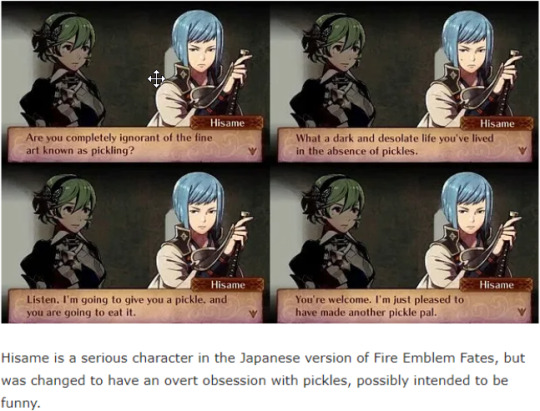
I can never stress this enough, but Hisame made pickles in the Japanese. He was always talking about them in the Japanese, too. (Fates loves supports revolving around food in general, really.) I think people generally know this to be true? But I did read some comments saying that the pickle love was totally made up in the localization, you can see the proof above, so I had to point it out.
I don’t think a lot of people who have talked about his character picked up on this - admittedly, I didn’t until someone close to me explained it - but the main gag of Hisame’s character is that he’s young, but already acting like an old man. He lectures his own father on how to behave, etc., and makes pickles. And the “acting like an old man” is not totally lost in translation, with him still acting serious and lecturing his father. But the making pickles trait… I’d never pin that as an “old man” stereotype as a US American. Well, now I would, because I know Japanese culture well enough… but anyway.
And this is where the cultural differences come in. The number of people farming and making traditional foods from scratch is dwindling fast in Japan. In just five years there, I watched countless rice paddies and other small produce fields be turned into houses or apartment buildings. The elderly farmers are becoming too old to care for their crops, and their kids choose to pursue other careers, so the family sells off the farmland. Following along this trend is traditional pickle making. You can just buy them ready to eat in the supermarket, so why make your own? Most people don’t even have the space to be making them if they wanted to. And so, pickle making has come to be seen as something old people do. It fits in with Hisame’s “old man” character perfectly.
But again, as an American, I never would have figured that out without knowledge about Japan. Of course you could argue that the localizers didn’t need to change anything about him. The making pickles was quirky and unique, and would give you a chuckle as is. But there was space to make him funnier, so they did. That is, after all, was what the Japanese intended, for it to be funny. It’s not funny in the same way… but sometimes it’s impossible to be.
And that is what is most important in localization between two wildly different languages like Japanese and English - not retaining the same words, but the same intention or mood. The same words can convey a totally different meaning or mood, or make no sense, because of cultural differences. So localizers need to achieve the same mood, not the same words. I have come to see people understand this much better as the years go on, and the general gaming population becomes more learned about what localization is.
Of course, that’s a pretty simplified way of looking at it. But that’s how I summarize localization as a whole, in an easy way to understand. You might not agree with exactly how the localizers did what they did, but I think we might all be able to agree that they were trying to do their job and had no malicious intent to butcher the Japanese original or something absurd like that.
One more thing that’s relevant to this - Japanese people don’t care about repetition so much. The same character tropes are repeated over and over, the same lines are repeated over and over… In the US, we don’t like that! It’s boring and dull! This cultural difference is a constant struggle in localization. A lot of the people who think they want a direct translation don’t realize that it will be boring to them… So localizations alter and add details and lines here and there to give some more variation. This also helps to explain Hisame’s changes to talk even more about pickles.
And I’ve seen many a comment from people saying they liked Hisame in the localization. They found his exaggerated pickle lines fun, and enjoyed many good laughs. How can we call his new characterization outright bad when it worked for some? When they like it more than a straight Japanese translation? He’s still essentially the same guy… just some of the things he says are different. That’s not much of a change at all.
...And back to that original screenshot I showed. Isn’t Hisame still serious in the localization? His lines are funny, but I’m under the impression that he himself is still dead serious. ...Anyway. That’s about all I have to say about Hisame.
Many characters have changed lines. There’s no disputing that. But something to always question is how far do these changes go? Did the localizers completely change the intent or tone of the original? Or are they playing up certain character traits the characters always had in the Japanese? Or is something else going on?

This is also a prime example of how shallow some articles or “analysis” into the Fates localization are. You can’t look at one line change and make a sweeping conclusion about an entire character. Always be suspect of stuff like this. Kana ALWAYS acted like a little kid. That’s their entire schtick. They are your cute little mama/papa loving kid. That one line may have changed that scene significantly, but Kana’s whole character? No, not at all.
Even Kana’s S support changes aren’t as simple as it seems. They aren’t all changed. The 2nd gen characters that Kana is close in age to retain their romantic endings, such as Midori. Only those considerably older than Kana turned platonic.
And Effie, another character commonly cited as changed? She wasn’t radically changed from some deep character to a one-note workout buff. If only a conclusion could be that easy to reach. Overall, on this specific aspect of Effie, the localization simply added in extra strength or workout jokes when the opportunity arose. Some workout jokes were in the Japanese! She was always an extremely devoted retainer who was always working out and training to get stronger so she could better fulfill her duties.
What is MUCH more interesting in my opinion is the issue of her femininity. In the Japanese, her speech nearly always trailed off with ellipses, and she had feminine voice acting. Whereas in the English, all of that femininity is stripped away with a deep voice, and virtually no ellipses. How refreshing it would have felt in English for Effie to have retained that femininity! Women can bench press trees and be feminine! It would be unique to see a female character like that. ...Or so a US American might think.
But from what I understand, strong female characters in Japanese entertainment are nearly always very feminine. They send a clear message: “You can be whatever you want in private, so long as you still fit the girly-girl mold in public and fulfill society's expectations for you!!” In the Japanese, Effie is fitting their stereotype.
So in one way of looking at it, Effie wasn’t really changed, because in both Japanese and English, she paints a stereotypical and the most socially accepted image of a physically powerful female in each culture. ...That’s an interpretation of mine, anyway. I’m not sure how many people would agree with it.
...See what I mean, that the answer of “changed or unchanged” really isn’t as straightforward as “are the lines translated directly?”
Looking into the deeper details creates a much more interesting picture! You come to paint a picture in your mind, without even thinking about it, of what the localizers intended to do, and you can at least understand what they were thinking. This forms a much more accurate conclusion on whether or not the team achieved a good localization, and whether or not that sacrificed the intent of the original.
So as you can see, few issues are as bad as they’ve been blown up to be. None of the characters are completely different from their Japanese counterparts, or anything so extreme. They were just localized. Whether or not they were localized well, is up to each person’s opinion.
...I do want to write about Soleil, as an example of someone who I think could have been localized better, but I’ll save that for another day. It’s gonna get long. If anyone is interested in seeing this post, just remind me every couple of months or so until I find the time and write it, thanks in advance.
Memes
Since I mentioned Kana’s dragon speak in the last section, this is a perfect time to transition into my feelings about memes, aka context-specific humor. I agree with the most commonly shared opinion: memes don’t belong in localization. Though it’s not just because of a simple “change from the Japanese is bad!!!!” approach. In my opinion, the best localizations will be as timeless as possible. I want my future self and everyone else who will play the game in the years to come to enjoy the game as much as possible.
Memes come in and out of fashion so quickly that they’re almost guaranteed to be out of date by the time they release. And only the most popular of popular stories will be widely-known enough for most everyone to get the reference. Of course, it’s pretty difficult to know what expressions and such people will remember and use 10, 20, or 30 years down the line. Some language you think will be timeless will fall out of style. But using memes and references that are not likely to appeal to as many people as possible… that’s one of the few things I can almost universally call “bad localization.”
Unless, of course, the game was intended in the Japanese to be a product of its time, and used a lot of references. That’s a whole different ball game.
Accurate translation, much less full localization, requires creative thinking to recreate the tone and intent of the original.
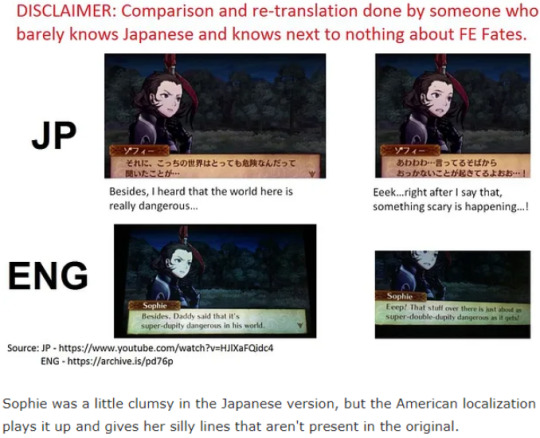
Here’s another example that showcases another couple of things I find really important to localization.
Number 1: The writer of the article said “The American localization … gives her silly lines that aren’t in the original.” But does it really “give” her anything new at all? I’d argue not. Tottemo is commonly translated as ‘really’ or something like that… but doesn’t ‘super-dupity’ convey the same meaning as ‘really’? Just because an English word isn’t given as a common definition for a Japanese word, doesn’t mean it can’t be a definition. Sometimes… a word we don’t commonly think of as a translation for the Japanese, can still be a perfectly valid translation. This is not an addition. Just an uncommon translation of the Japanese word.
Number 2: Japanese has a wide range of “I” and “you” pronouns, sentence endings, and other little things that define character age, personality, gender, and more, that simply don’t exist in English. To not use similar features of English when localizers find opportunities to do so, would just take away that sense of nuance the Japanese had in utilizing their language’s own unique features.
Of course it’s one possibility that Sophie uses kiddy words. She’s not a little kid, but she’s still pretty young! To have everyone use the same word choice, because that’s how the words translate into English, is not only inaccurate to how real people talk, but also inaccurate to how the original Japanese was used. Since many equivalents for Japanese word and grammar choice that define personality do not exist in English, the localizers have to use what does exist in English in new places. I think that makes sense, and creates a much closer script to the Japanese than just translating the words.
Again, it’s all about how we look at the lines!
I see a lot of people define “translation” as “one-to-one recreation of the Japanese words.” To reinforce what I said in the first section, I do not think this is true. To me, translating is recreating the same tone, mood, meaning, and message of the original. You CANNOT achieve that just by translating the words and grammar alone.
Different words conveying the same overall meaning.

This section is really just a continuation of the previous one. But reinforcing central arguments over and over again is the core of good essay writing.
So this is one of my strategies for deciding whether or not a script is a good or bad translation/localization: “Does the script convey the same basic meaning?” (or tone, etc.)
Changes, adding detail to what the Japanese said, and “playing-up,” are all wildly different things.
So first, I break down the bit of dialogue into as few words as possible.
-Nohr royals inherit dragon blood.
-So they have superhuman power.
...And then I look to see if the localization conveyed that same basic meaning. Which, in this case, I think it did. Your mileage may vary, but I think I’ve made my point at least.
I wanted this scene to be one of the five I addressed because I think it exemplifies yet another of the fascinating differences between Japanese and English. Japanese is a language that likes to be vague, and leave out context that is already established. Speech can seem super boring as few characters say anything unique. (At least… that’s how us English speakers see it! Japanese people think they are just being normal, and not vague or boring at all!) ...English, not so much. So much as leaving out the subject of the sentence is chastised as incorrect grammar. And we like unique dialogue and prose more than most other languages.
I saw one person in the comments of the article I got this visual from argue that the tone is totally different, that the Japanese was more of a history lesson, but the localization is trying to pump Corrin and Leo up for battle, but… eh, I just don’t see it. The English also just feels like he is describing the powers of their bloodline to me. Again, that’s why this is so complex and fascinating, because everyone has their own viewpoints they are coming from.
The “direct translation” and “localization” reach the same message. This isn’t a big change in my opinion at all.
Sometimes mistakes happen...

These interpretations of Saizo and Beruka’s C Support have always boggled my mind. Coming up with all these explanations as to why the omission was done on purpose to completely erase the support when… it just seems… obvious to me… that the localization team never wrote or programmed a translation and shipped the game with the placeholder?
After all, if the localization team felt they had to remove or change content that might be questionable for the target audience, wouldn’t they alter or rewrite the conversation, like they have with Soleil’s supports, for example? This very game has multiple examples of proof that the localizers will rewrite entire chunks of script if they feel it makes the scene better fit what the target audience be more comfortable with.
Mistakes happen. That’s all I think Saizo and Beruka’s C Support is. We probably never got an update just because Nintendo doesn’t have a track record of being the best with those.
Of course, I may be wrong. Nintendo and Treehouse keep pretty much all of their processes a secret. But I never, ever would have imagined on my own that Saizo and Beruka’s support was omitted on purpose. Citing this as a reason why we need to be up in arms about bad localization is so absurd to me.
Mistakes happen. It’s not like the Japanese creators didn’t have embarrassing moments with underdeveloped content in this game either… they didn’t even name the continent in this game!
Sometimes, “bad” localization is just human error. It’s something we can’t eliminate entirely, and will just have to accept.
Final thoughts:
I realize that this analysis, for as long as it is, is very short, and still leaves out so much that could be talked about.
But what I hope that it did was not really help convince readers that the Fates localization is actually good, exactly… but helped to create some more balance in how we look at the Fates localization and localizations as a whole. All localization changes have a reason and nuance to how they ended up happening, and it’s important to be thinking from that perspective when we discuss them!
Since I know I may have created more questions than answers, again, feel free to keep the conversation going through more asks! I’ll answer them in time!
#fire emblem#fe#fe14#fates#fe fates#nintendo#2ds#3ds#nintendo 2ds#nintendo 3ds#japan#japanese#translation#localization
15 notes
·
View notes
Text
Coffee Spoons: Chapter 5
a party,,,
On AO3. On FFn.
First ; Previous ; Next
"And what do you do?" asked Takahashi Fumihiro, CEO of Issho ni Kursuri; the number one competitor of Vasta Pharmacueticals in Japan.
"Mainly basketball," Michiru replied. "It's not a professional league or anything, but it's pretty competitive and we're good."
Alan smiled pleasantly as Michiru continued to explain her team's position in the intermural division. Fumihiro, absolutely baffled, listened and nodded along. It was probably a nice change of pace from the constant peacocking, demure bragging, and veiled threats this little party was brimming with.
Fumihiro's wife, Laurence, tilted her head. She had clearly picked out the English word in the babble of Japanese. "I played football in college," she said in a heavy French accent. And in English.
Alan watched the panic flash across Michiru's face. Her eyes widened, and he watched her mouth pull down into a little dazed grimace. He quickly translated for her, adding that Laurence was from France.
Michiru perked up at this. "She's from France? Is she from Paris? Has she seen the Eiffel Tower?"
Fumihiro translated this time, remembering that his wife was not actually fluent in Japanese and was likely bored out of her mind at a party filled with Japanese men.
France. Alan could feel his smile grow tight. There was a place Alan wished hadn't come up tonight.
Michiru, fed up with Fumihiro's translation, pulled out her phone and began typing. Laurence looked it over, took the phone, and typed something back. They passed the phone back and forth between them, and Laurence even laughed, while Michiru drilled away at the keyboard.
Fumihiro watched this, bemused, before returning his attention to Alan. "I've heard your company is looking into synthetic blood. Awfully flooded market, wouldn't you say?"
"And here I thought our scientists signed confidentially agreements," Alan said, voice light and jovial. They were not actually looking into it that thoroughly, but junior scientists jump at the chance to prove their worth, and who was Alan to dissuade them? "And how about you?"
"Good." Fumihiro's tone was final, like a load of bricks crashing to the floor. "We have a new joint contract from an American company. We're moving into clinical trials within the next six months. A diabetes treatment."
Alan could have punched him right in the teeth. "Sounds like an exciting venture!" Alan said. "Figures the Americans spearheaded this. Hopefully your company can develop some patentable products in the future, so the profits are all yours."
"You as well," Fumihiro ground back.
Alan took Michiru gently by the elbow and moved her away from Laurence. They waved goodbye.
"She was really nice," Michiru said.
"What did you two talk about?" Alan asked, handing her a glass of champagne.
"Just sort of normal stuff. I asked about what she did, and France, and she asked if I had ever been to Tokyo." She took a sip, looking around at the art.
Alan walked next to her, one hand behind his back, the other holding another glass of champagne. "Have you?"
Michiru's looked a long time at a dark red line stretching across the white plain of a canvas. "No." There was something in her voice, like she was trying to be breezy, like he had hurt her feelings. "Are all these paintings for sale?"
"If I want them to be." She looked at him, something like a smile on her face. Alan was encouraged by the expression. "Pick one out. I'll wrap it up and send it to you." He wasn't sure if he was joking or serious. It depended on her.
She clapped her hands together and moved deeper into the gallery. "Well, let's see what we have then."
Alan glanced at his watch while she dithered over a splattered sunset. He had maybe fifteen minutes to indulge in this before he would have to head back into the fray. Might as well make the most of it. "I've never been a big fan of cities, myself." Testing the wasters out, seeing what that Tokyo reaction had been all about.
"Really?" Michiru looked at him, eyes round. "I've always loved cities. They're so big and full of life. Hard to be lonely when there's so many people around."
When had you been lonely, Michiru? "But you didn't grow up in Yokohama, though, did you?"
She snorted, cocking her head at another painting. "No. I grew up in the opposite of Yokohama." She wasn't really looking at the painting anymore. Murky brown eyes, wading through the past. He should be a poet. She looked like broken lines and paragraphs. "You wouldn't have heard of it."
Alan turned this over. A small-town girl—that explained the wonder, the exuberance. And, perhaps, the earnestness. You didn't have an art gallery in your town, did you, not within miles. "But you made it here."
Michiru looked at him and smiled. "Nazuna and I."
They came upon a sculpture. It was huge, stretching towards the ceiling in impossible arches and spindles. Michiru walked between the legs, head craned back. She seemed—what, fragile? Maybe soft, next to the hard stone.
"I'm sorry," Alan said. "I missed that."
Michiru repeated: "Where did you grow up?"
Alan considered lying. But. But. He didn't know enough about her. He couldn't think of something that she would buy, something sincere enough. Well, and maybe he was tired, too. "Bit of everywhere. My parents were divorced—my father thrice, actually. I never saw much of my mother. My father traveled for work; I was sent to boarding schools. My mother sent Christmas cards." His words came out more bitter than he had intended. He shrugged. "A fine childhood."
Michiru leaned against one of the supporting beams of the sculpture (which numerous signs warned against). "What were they like?"
"Who?"
Michiru's mouth quirked into a smile. "Your parents."
"Oh." Alan didn't have an answer for that. "Good. They were good parents."
The words came easy, but something must have been off, because Michiru clearly didn't believe him. She pressed her lips together, eyes flicking up and down. It wasn't very often Alan was caught out in a lie. "My parents were divorced, too." She said this in a hushed voice.
Alan was suddenly, vividly aware of Michiru's presence. Her hair, dried strange after the rain, the flush in her cheeks, her eyes, watching him, dark in the shadows of the obelisk. She seemed so solid, feet planted on the ground, gravity pulling them both downwards. Her parents had been divorced in a small-town Alan didn't even know existed.
"Well," he heard himself say from far away, "generally divorce creates a happier household."
This seemed like a wrong thing to say, but Michiru nodded, serious. And Michiru, the emboldened, the enthusiastic, the sanguine, said: "Sometimes those things are better—well, it's better to use your head, you know?"
Oh, Michiru. "You know," he said, giving her his champagne glass in exchange for her empty one, "you're quite mysterious."
5 notes
·
View notes
Text
Tokusatsu Streaming Guide: Where to Watch Kamen Rider, Ultraman, and More
https://ift.tt/2VR6eGr
Ten years ago a fan of Tokusatsu (Japanese special effects shows, mostly superheroes) could have never imagined the access we’d have to these programs today. Back then official releases of anything outside of the American adaptations, particularly Power Rangers, seemed like a far off dream. However in the past few years especially there’s been a slow trickle of Toku shows becoming available to stream in North America.
In the last few months though that trickle became a waterfall as several new services have quickly become mainstays, finally allowing Toku fandom to finally enjoy their favorite shows legally. This also allows more casual fans a chance to experience these shows for the first time and that’s who this guide is mostly for. If you’re curious about the wider world of Tokusatsu and need a place to start, this guide should cover your bases for the many kinds of Toku series out there.
Just as a note, we are only discussing shows that are legally available. This also isn’t a comprehensive list. Many of the streaming services mentioned below have multiple Toku series available, we’re just picking a small sample. With that in mind, let’s dive into this ocean of Toku, shall we?
Kamen Rider (1971)
Available on TokuSHOUTsu (Shout Factory TV/tubi/Pluto)
The release that shocked and delighted Toku fans, the original series in the long running Kamen Rider franchise may be old but that doesn’t detract from its enjoyment. This is Toku in its purest form. Incredible fights, trippy special effects, bizarre monsters, and a strikingly bleak backstory for the main character.
Hongo Takeshi is kidnapped by the evil Shocker and transformed against his will into a cyborg. Worrying if his humanity is intact, Hongo still fights for justice as Kamen Rider. It may seem simplistic in our modern age of superheroes but there’s something enduringly appealing about Hongo’s quest to stop evil despite the wrongs that were inflicted on him.
Plus, come on, you can’t beat those trumpets that come in for damn near every music number. Highly recommend if you’re down for old school heroics or just want to enjoy some trippy 70’s TV.
Zyuranger (1992)
Available on TokuSHOUTsu (Shout Factory TV/tubi/Pluto)
Many people reading this are no doubt aware of Power Rangers, especially the original Mighty Morphin series. If you want to rock your world, you gotta check out the Super Sentai series Zyuranger. It’s as far from MMPR as you can imagine, with a team of dinosaur-evolved humans from 170 million years ago brought into the present day.
Read more
TV
Power Rangers and How It Adapted From Super Sentai
By Shamus Kelley
TV
TokuSHOUTsu: Kamen Rider, Ultraman, and Super Sentai Coming to Streaming
By Shamus Kelley
The differences between it and MMPR will be the main draw for most and as you watch the series you’ll be impressed just how much the producers of Power Rangers were able to take this footage and remold it for America.
Ultraman Mebius
Available on TOKU
You can’t do a list about Tokusatsu without giving love to one of the big three, Ultraman. While the franchise’s original series sadly isn’t streaming (but you’ll be able to soon), you can’t go wrong with the 40th anniversary season Ultraman Mebius. Following the adventures of the rookie Mebius, the Ultra comes to Earth and joins up with the attack team (hilariously out of context) named GUYS. Mebius, GUYS, and even a few characters from past Ultraman series, fight off giant monsters attacking Earth.
Read more
TV
The Challenge of Bringing Ultraman to America
By Shamus Kelley
Comics
Marvel Reveals Ultraman Details
By Shamus Kelley
Both a great introduction for new fans and rewarding for long time Ultra fans, Mebius is a fantastic show to jump headfirst into the hero that’s larger than life.
Garo
Available on HiDive
If you want something off the beaten path of the big three Tokusatsu franchises, Garo might be right up your alley. Feeling a bit darker than other Toku (and not just because much of the action taking place at night or in darker spaces), the series follows Makai Knight Kouga Saezima attempting to protect humanity against the evil “Horrors.” Along the way though he encounters Kaoru, who is set to die in 100 days, and he sets out to try and save her.
Everything from the look of the series to the designs of the Garo suit feel different from Sentai, Kamen Rider, and Ultraman and if you aren’t feeling the more traditional vibe of those series Garo might be right up your alley. It’s also the first in a very long and surprising franchise so if you like it, there’s a lot more to get into.
Space Sheriff Gavan
Available on Toei Tokusatsu World Official
The first of the not as often remembered Metal Heroes franchise (although some of the series in it were adapted into VR Troopers and Beetleborgs), Gavan stands out for just how wild it is from the jump. Sure there’s the story about Don Horror (wonder if he’s a bad guy!) trying to destroy Earth and Retsu Ichijouji (Gavan) being sent out to stop him but that’s all icing on the cake.
Read more
TV
American Tokusatsu Shows: VR Troopers
By Shamus Kelley
TV
American Tokusatsu Shows: Big Bad Beetleborgs
By Shamus Kelley
Metal Heroes have a reputation for bonkers visuals along with great action and Gavan delivers in spades. From the opening seconds of the first episode we’re greeted with Gavan standing atop a robot dragon standing against a gloriously lush background of outer space. Lead actor Kenji Ohba is also stunning in his action scenes and he puts even the superheroes of today to shame with just how good he is in these hand-to-hand fights.
Love action? Love weirdness? Want to be cool and not go with the obvious choices? Gavan might be for you!
Android Kikaider
Available on Toei Tokusatsu World
An absolute smash hit in Hawaii that’s still talked about to this day, Kikaider is more classic ’70s Toku action if Kamen Rider wasn’t enough for you. Following the heroics of robot Jiro against the (obviously) evil DARK, the main draw of the series is not just the delightfully over the top action but also the compelling conflict between Kikaider and evil robot Hakaider.
We should also mention that while the first two episodes of all series on Toei Tokusatsu World are subtitled, further episodes that will be uploaded won’t have them and it’s being left up to fans to subtitle the rest. Even without subtitles though, Kikaider’s action should more than keep your attention.
Dynaman (Night Flight Dub)
Available on Night Flight Plus
Easily the strangest entry on this list, Night Flight’s Dynaman isn’t just the seventh entry in the Super Sentai series. Oh no, it’s a little known dub of the show that aired on USA Network’s Night Flight program in the ’80s. It’s a gag dub through and through and mostly relies on pop culture jokes and (and we’re being generous here) outdated humor.
Still, it’s a peek into one of the earliest examples of Toku being brought to America on a large scale. For that alone it’s worth checking out, especially for those interested in the history of Toku in America and exploring the “what if” of imagining this getting popular instead of Power Rangers.
Gridman The Hyper Agent
Available on TOKU
Bold proclamation to make, but Gridman has the absolute best design of any Tokusatsu hero ever. It takes what worked well enough for Ultraman but added extra detail in all the right places to create a truly iconic look for a hero.
Gridman follows three hip computer kids (Naoto, Ippei, and Yuka) whose videogame superhero is taken over by the interdimensional Gridman who then combines with Naoto. The computer hero fights against the digital monsters of the evil Kahn Digifer in some of the best looking fights of all the series we’ve mentioned. Some shows might have better action overall but the look of the computerized world of Gridman can’t be beat.
Read more
TV
American Tokusatsu Shows: Superhuman Samurai Syber-Squad
By Shamus Kelley
TV
SSSS. GRIDMAN Episode 1 Review: Awakening
By Shamus Kelley
The show may look familiar to some American fans as its footage was used in Superhuman Samurai Syber-Squad. Gridaman also experienced a revival in the form of the SSSS.GRIDMAN anime, which redid some of the concepts of the original series with a few easter eggs to Syber-Squad for very hardcore fans.
Special Rescue Exceedraft
Available on Toei Tokusatsu World Official
Look, I’m going to be real with you. I’ve only seen the first two episodes of Exceedraft. I have no idea if the whole series is good. What I can tell you though is that the first episode is straight up the most batshit wild episode of any Toku I’ve ever seen. It’s like if someone took the plot of Speed and said:
“Aha, let’s do this but condense it down to 20 minutes, add in some shiny superheroes, and make it way more intense.”
Also, the title of the episode is “The Kindergarten Bus of Death.” Just watch it. If you watch nothing else on this list, watch this episode. It’s Toku on, well, speed and it’s fantastic.
Jetman
Available on TokuSHOUTsu (Shout Factory TV/tubi/Pluto)
What if Super Sentai, but a soap opera? It’s not that Tokusatsu had never had soap opera elements before or after this series, but Jetman took that idea to a level that’s still being talked about today. When Red Ranger Ryuu’s partner is killed in an attack by the (say it with us now) evil Vyram, the powerful “Birdonic Waves” are unleashed on four unsuspecting civilians. Ryuu recruits them and they become the Jetman team.
With strong characterization from the start, Jetman stands out by jumping into the romance between team members as Ryuu struggles with his growing attraction to White Ranger Kaori. It’s standard soap opera stuff, with a love triangle thrown in for good measure (which would have been better if Kaori was given more agency), but if you love those tropes then Jetman might be the series for you.
As we said earlier, this is only a small sampling of some of the shows available on streaming sites in North America. What are some of your favorite Tokusatsu series that are available to watch and which ones do you hope are picked up in the future?
The post Tokusatsu Streaming Guide: Where to Watch Kamen Rider, Ultraman, and More appeared first on Den of Geek.
from Den of Geek https://ift.tt/323lmEt
1 note
·
View note
Text
BNHA Rewatch: Episode 27 “Bizarre! Gran Torino Appears!”
mysterylover123
The Internship arc starts off with a bang! Let’s see that Full Cowl, Deku!
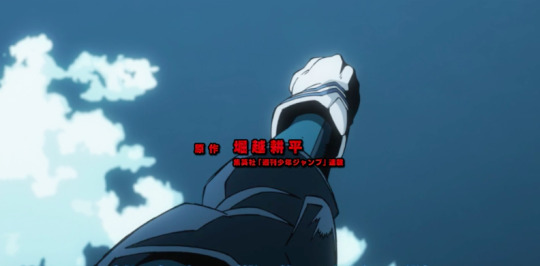
SORA NI UTAEBA! While the song in this intro is kinda meh to me, the visuals are amazing. I love the symbolism for all the events of the ep - tho not gonna lie, this core’s ED is better than the OP. Anyway tho, go punch that wall Deku!
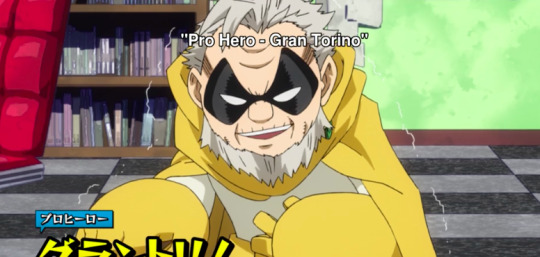
We start with Gran Torino pretending to be crazy. I’ll admit, I’m kinda eh on this bit, though I love Gran. It’s probably because I found it annoying when Yoda did it, so I find it annoying here as well. (It’s really just my inner fangirl talking. Nobody makes Deku unhappy except Kacchan. Who can get away with it.)

But actually, this sets up an interesting difference between Deku and Luke, though admittedly situation isn’t the same because Deku knows Gran is Gran. But Deku’s response to this is to call All Might to tell him Gran’s gone senile. He’s so empathetic Deku why aren’t you real? (no shade at Luke there,e I love him too. Just not as much).

“I don’t have time to mess around.” Deku did not come to play.

New costume! It’s incredible how much better it is than the old one. Like, not even funny how much better. Day-um, Deku.
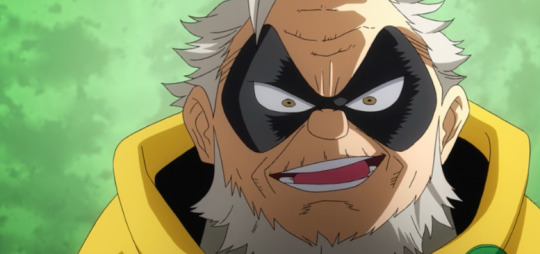
Pfh Gran knows exactly how to piss off Deku: Insult All Might. You clever little scoundrel.
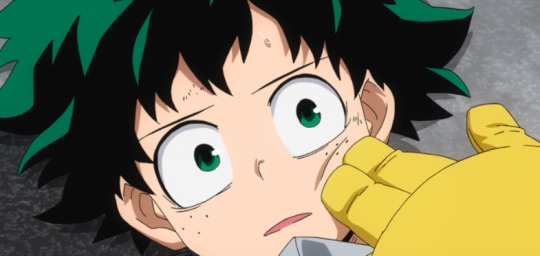
So onto Deku’s character flaws: 1. He’s overly analytical. Deku doesn’t know how to act quickly, partially due to circumstance, but partially that’s just how he is. Hesitant. Over-cautious, over-thinks things. He needs to learn how to take action - and in this arc, he does indeed do so without hesitation, and saves Iida’s life by so-doing. Box 1 checked off.
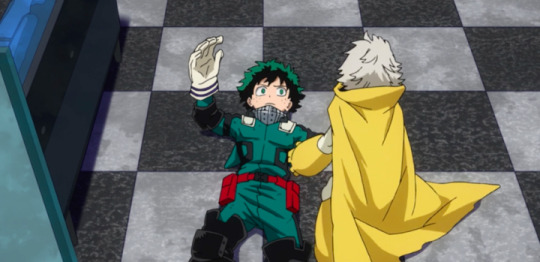
2. Deku admires All Might too much. Like every MC in BNHA, his Imitation is the Sincerest Form of Tragedy (insert me telling you to read that essay again). It’s a problem because he doesn’t believe in himself. So he needs to learn not to imitate All Might and be his own hero. That one doesn’t really sink in until the PLE arc. But check.
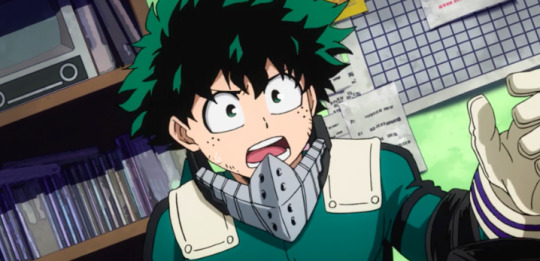
3. Deku is insecure. He has a massive inferiority complex (which fits nicely into his foil’s inf-sup complex, wouldn’t-cha-know) and doesn’t believe in himself. So he needs to learn to be more confident. (Is it wrong that I want this to end with him breaking through Instrumentality to a chorus of his friends saying ‘Congratulations’?)

Gran is my favorite Teacher, as a teacher, in BNHA. I’m a teaching-major, and I kinda aspire to his techniques. What I love the most is helping students figure it out themselves. Just telling someone the answer doesn’t help them. It’s so satisfying seeing a student make that breakthrough thanks to your guidance.
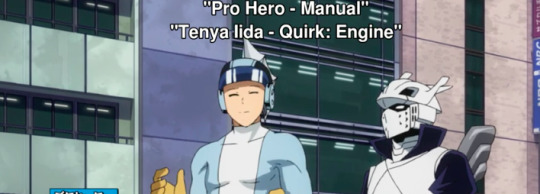
Now we’re cutting away to Iida’s internship to remind you Iida Wants Revenge. This is a little exposition-y, let’s cut somewhere else.
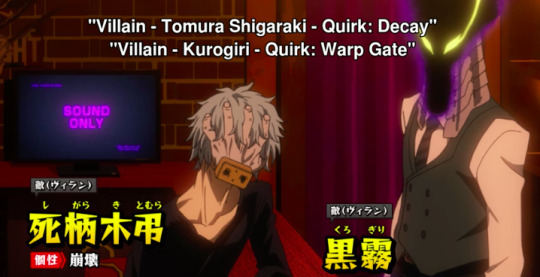
OK good, the villains! Right off the bat, we’ve got some great Parallels with the Heroes, as Tomura decides to basically Intern with a Pro-Villain. He even calls Stain a pro. Tho Tomura really needs to work on his recruitment strategy. “Stain join us. Cause.” “Bakugou. Join us. Cause”.

I want Deku and Tomura to build a grand Hero-Villain rivalry. Tomura basically hates him for no real reason right now, and I want there to be a good reason. Other than “He’s All Might’s successor”. I want them to be the Joker and Batman of BNHA with a real complex hero-villain rivalry, where one reflects the other. They’re getting there but I want more.

“Bloodlust without conviction is meaningless.” Ooh I love me some Stain. He really elevated this series’ philosophical side with his ramblings on heroism and villainy.
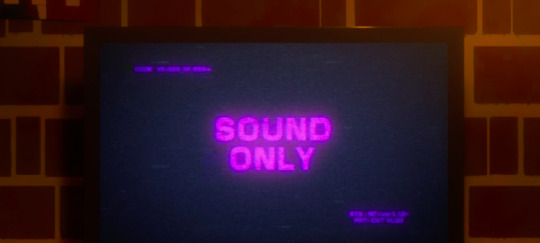
OK am I creeped out by the fact that All for One just said the same thing I did about learning? A little.

Deku is so brilliant and such a fast learner tho. It doesn’t take him long to put it all together. And Gran actually really admires him for that - I enjoy their mentor dynamic a lot, since Gran has some real respect for Midoriya in a different way from All Might.
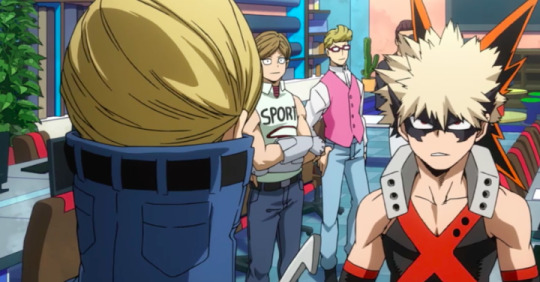
Bakugou with Best Jeanist! OMG the comedy gold of this. Though I just want to take a sec to gripe about a change from the manga to the anime: Manga! Bakugou does not charge at Best Jeanist and yell at him. He’s not dumb enough to try that on the #4 Pro Hero and his teacher. He sits still and listens to Jeanist’s lecture. The only Bakugo line here that’s from the manga is “Didn’t you make an offer for me?” This completely changes the way we perceive Bakugo in this scene, and in general. Bad change.
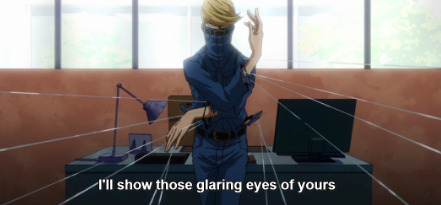
But in Good Storytelling-ville, I like the continuing parallels between the Wonder duo this creates: Izuku interns in a rundown neighborhood with an unlisted hero, Bakugo in Tokyo with a top pro. Izuku needs to learn to control his power and believe in himself. Katsuki needs to learn to be kinder and more humble. Izuku learns his lesson her, Katsuki doesn’t. Parallels!
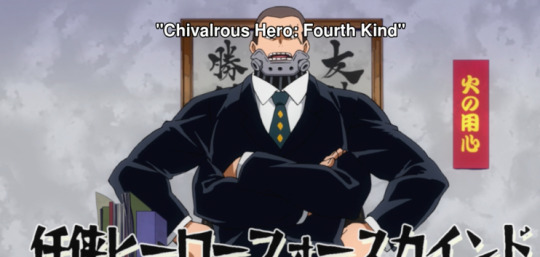
Kirishima and Tetsutetsu again! 4th kind is ok. He’s probably the least memorable of the internship pros, since his gimmick is simple and his design kinda dull.

Uraraka and Gunhead! I love how well they get along. He’s kawaii and she’s a hardcore badass. Don’t you forget it!

Now for more of Momo’s arc. The Uwabami internship is usually dismissed by fans as Just Fanservice, but think about it in context, and it becomes really interesting. One, the Hero Killer arc is about Stain protesting the commercialization of heroism, so we do need to have a Pro-Hero demonstrate the problematic nature of that commercialism. Uwabami does just that. Two, we need to have Momo’s internship be unfulfilling to her, to complete her downward trajectory (before the Final Exam arc can bring her back up), so it’s useful for further embarrassing and developing her character. 3, it sets up Momo and Kendo’s future rivalry.
I’ll take more about it in future eps where it appears.

Izuku practicing and constantly hitting his face on the wall is one of those things that makes me wonder if either a) he has a secret endurance quirk or b) OFA just naturally ups your durability. How does he still have a face after that.
Here’s a hot take: Izuku with his face smashed up from spending a night with no sleep training in garbage all night is still prettier than any other guy in this series.

One of the reviewers I follow made the comparison between All Might vs Deku’s using of OFA and Korra vs Aang’s role as the Avatar. You know, All Might and Korra, both master the power pretty quickly so they get to be strong fast but lose out on the spiritual connection a bit, while Deku and Aang take their time learning ofa/the four elements, but get as a tradeoff more of the spirit-y side...(ATLA & BNHA. My 2 favorite shows, alongside FMA. I swear these are like, three sides of the same show).

While I’m watching in the Sub this time around, i wanted to note a dub-ism in this scene: it’s localized to ‘hot pastries’ instead of taiyaki. There’s a lot of bits like that, where they take Japanese food and translate it for us dumb Americans. But well, maybe that made sense in the 90s, when there maybe wasn’t as much cultural crossover, but...even I knew what mochi were before watching BNHA (Uraraka’s fave, and the dub always localizes it to ‘sweets’) and everyone has google if they’re confused so why not just say ‘Taiyaki?’ Ah well, it’s a stupid nitpick but still.

Gran’s metaphor here is so great. As a teacher I aspire to learn from this man. Teach me your teaching ways.

“THIS TAIYAKI IS ME!!!!!” Another dub-ism has him say “I’m not really a dessert” I saw a reactor once comment on this ‘Yeah, but you are a snacc, Deku.’ I wholeheartedly agree.

FULL COWLLLLLLL!!!!!!! FYEAH!!!!!
OK so there are a lot of reasons I love Full Cowl. it’s one of the series’ finest moments, emblematic of what makes it cool. And what makes Deku cool. He’s smart, and has to work his way around problems, and this solution was just...it was there, for us and Izuku the whole time, to finally sit up and take notice of. It’s about applying power in a different way. About taking what you can do and doing the best you can with what you’ve got. A big central theme for the series.
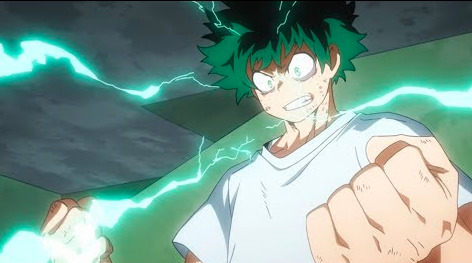
Also dayum that slow pan up Deku’s entire body as he activates it...he just looks good in this arc. Actually, post-cavalry battle Deku in the sports festival arc always looks weird and odd (because he’s beat up and in pain, duh) and prior to that he was mainly just adorable...this arc, however, is his official transition into Best Boy for Reals. He’s just...swoony. and also really cool, smart, and all sorts of great fangirl-y things.
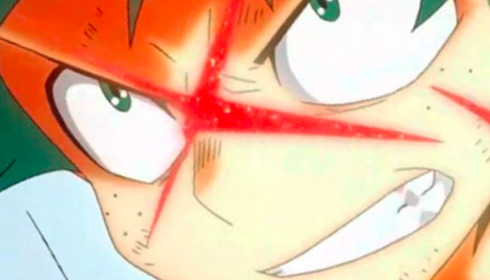
We end on a confident Deku smile and Daiki’s adorable ‘hai.’ Basically, i really enjoy this episode. A little slow at the beginning, maybe. But that conclusion is amazing and so worth the payoff. It’s even got this amazing rhyme and rhythm to it, cutting back and forth between the different students and teachers and just having themes echo between each other like poetry. It love it.
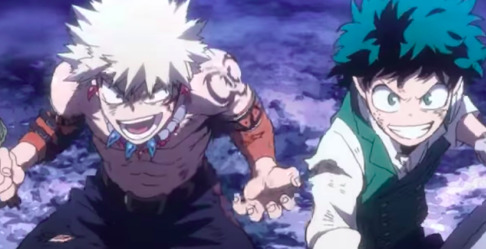
To close off: ED4, AKA BEST ED EVER!!!! This is seriously, no sarcasm, best ED. So for those of you who don’t know, the story behind ED4 Datte Atashi no Hero is, 1: The Fantasy AU theme comes from the second popularity poll, which came out around Chapter 120/Episode 61 (yes, THAT one) and for which Horikoshi drew the top 10 in fantasy garb. 2: The Song was written by LiSa and was explicitly stated by her to be effectively about Izuku’s feelings towards Kacchan. I wrote a post analyzing it. It is, basically, the anthem for...
BKDK CORNER

“Loose…” Guess who the first person Deku thinks of to create Full Cowling is? If you sad Kacchan, ding-ding-ding!


On an analytical note, I think it’s very, very significant that the first real breakthrough Deku makes in handling his power comes by observing Kacchan and imitating him. This is one of my Top 20 Favorite BKDK moments, even though it’s completely indirect, because of how important that is in the long-run. But what about the Imitation theme? Why is it OK for Izuku to imitate Katsuki, but not All Might? Well, first of all, he does use Gran Torino’s moves as well, but mainly, I think the series is saying with this distinction that it’s OK to imitate someone if you see their flaws and acknowledge them, but if you hero-worship them and see them as perfect, you’re only going to screw yourself over. This is why Iida imitating Ingenium, Shoto imitating his mom, Deku and Kacchan imitating All Might, and yes, Uraraka imitating Deku, are all so bad for them. If you see someone as perfect, and want to imitate them, you’ll never achieve that in your mind, because you already view yourself as imperfect. So Deku can imitate Katsuki because he thinks he’s a jerk, but also an amazing fighter, and Gran because he thinks he’s weird, but tough.
Also Deku just automatically thinking of Kacchan first is so damn shippy.
BEST GIRL OF THE EPISODE: Uwabami!
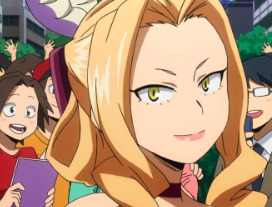
RANKER: Ranking the Internship Pros, least helpful to most.
10. Uwabami
9. Mt. Lady
8. 4th Kind
7. Endeavor
6. Death Arms
5. Manual
4. Selkie and Sirius (anime only)
3. Gunhead
2. Best Jeanist
1. Gran Torino! (Deku lucked out)
#my hero academia#episode 27#season 2 episode 14#bizarre gran torino appears#midoriya izuku#gran torino#katsuki bakugou#momo yaoyorozu#katsudeku#bakudeku#be prepared for lots of gushing#my deku bias is strong with this one#everyone has their fave#i'm glad mine's the mc#sometimes anyway#come s5 he's gonna be like#barely around for a whole damn season#anyway so glad to be at the Hero Killer arc#let's go!
16 notes
·
View notes
Text
biggest fan pt.3//kang yeosang
warnings: mild human captivity and swearing
once again, this story is not meant to romanticize sasaengs and kidnapping and make sasaengs look good and show a romantic relationship so please don’t think that this is what this story is about.
pairing: sasaeng!yeosang and idol!reader (non-romantic)
word count: 3,508
enjoy homies!!
this chapter is more mild so here’s a gif

“So let me get this straight, Ms. Son,” the CEO of your company said from one end of the long table.
“You’ve been sitting with this information for the past month and you didn’t say anything? Not even when it was announced that she was missing?” he said angrily. Your psychiatrist looked down at her hands that were resting on her lap before looking back up to your CEO at the other end of the table.
“Yes,” she nodded. Your CEO ran his hand down his face and sighed.
“Excuse me,” a voice said. Your psychiatrist looked at the faces seated at the table until she noticed a hand waving to get her attention.
“Before I say what I really want to say, I just want to tell you again that my name is Minami and I’m the closest to (Y/N) out of everyone here.” Minami said. Your psychiatrist nodded and smiled weakly.
“(Y/N) talked about you a lot in our sessions and she showed me a lot of photos of the two of you so I do know who you are. But go ahead, say what you need to say,” Ms. Son urged.
“Why did you wait so long to tell us this? It’s been so hard dealing with (Y/N)’s disappearance. And the police...they don’t even know where to start since there were no security cameras to catch her or anyone else and tell us where she could have gone or could be.” Minami said, tears filling her eyes.
“I’m grateful that you told us this because it’s better to know something like this later than never but...why did you wait so long?” Minami sobbed. Minhee, who was sitting next to her, rubbed her back soothingly as she sobbed.
“Please believe me when I say that I am terribly sorry that I waited so long to tell you guys.” Ms. Son started. “I’m on my vacation week this week and I was at home flipping through channels when I saw a show hosted by Heechul from Super Junior and Jonghyun from CNBlue about sasaengs and the effects of their behaviors on their idols. I decided not to the channel because I knew that (Y/N) was seeing me because of her anxiety which was caused by a sasaeng incident. About halfway into the episode, they mentioned (Y/N)’s case and that the police thought that (Y/N)’s disappearance was sasaeng related.” Ms Son paused.
“No one talked to me about (Y/N)’s disappearance other than to tell me that she had gone missing so I didn’t know the circumstances. So when I heard the statement, it made a lot of sense to me so I decided to meet with you to see what we could do in order to help find (Y/N).” your psychiatrist said. Your CEO nodded, satisfied with her response. He leaned back in his chair.
“So to recap, you said that (Y/N)’s captor’s name is Kang Yeosang?” he asked.
“Yes. (Y/N) was able to find his profiles on several social media platforms and showed me a couple of his photos.” your Ms. Son said. “I found them on my own and I have some photos of him that I was able to screenshot on my phone.” she said, pulling out her phone and entering the password.
“Here, pass this around.” she said as she passed the phone to your manager, Jaehyo.
“Wasn’t he at the fansign when (Y/N) passed out?” Jaehyo asked while passing the phone to Minami. She looked at the phone for a second and gasped before passing it to the member next to her. Minami nodded. “That was him. She started breathing really heavily when he sat down in front of her and she passed out not too long after,” she said.
As the phone was passed around the room and made it back to your psychiatrist, she slid her phone back into her purse and placed her hands on the table, glancing at the people sitting around the table.
“So what do we do now?” asked Ms. Son.
--
After that day with Yeosang, Yeosang gave you a lot more freedom. Of course he didn’t let you out of the apartment but he wasn’t as careful with you. He let you make your own food since you had lost a lot of weight since he kidnapped you and he let you have your phone and make secret social media accounts so you could keep up with celebrity news and news surrounding your group. Once again, you weren’t allowed to interact with fans or share any information with anyone or text or call anyone but you were grateful for the freedom.
Yeosang wasn’t as touchy with you and he didn’t interact with you as much. He spent a lot of time in the other room in his apartment doing God-knows-what.
--
Yeosang sat in the computer chair in the other room, deep in thought.
After that day, Yeosang knew that he had to let you go. He wasn’t as good for you as he though that he was; he was hurting you, both physically and emotionally and he saw that the day he almost did the unthinkable. Your tears running down your face and and the way your breathing increased and how panicked you became when his hand touched your waist and the way you writhed against him trying to get him off of you...he never wanted to do that to you again.
He wanted to let you go but the only problem was, how would he be able to do it without the police knowing or without you saying anything? He knew that what he was doing was wrong but didn’t want to face punishment for his actions.
He let his obsession get too far.
He went too far.
He’s sick.
Very sick.
But he needs to do something quickly before things get bad again.
--
You watched on Yeosang’s television as your group’s first subunit Paradigm-M(irae) performed their debut song “Ahead”.
A smile spread across your face as you heard the voices of the youngest members of your group sing over the trap music-sounding instrumental. You nodded along to the beat and tried your best to copy the dance movements that you had seen months ago when you watched the girls practice.
Chaemi rapped powerfully as she moved her arms in a whacking-style fashion. That part she had practiced for a while and you were happy to see that she had finally nailed it.
Yuki, your group’s youngest Japanese member, seemed to flourish on the stage. Her high voice danced over the other girls’ voices in the chorus. You always admired her ability to sing so powerfully despite being so young.
Finally, the group’s only mixed-race (Korean-African American) member, Natalia, began her English rap as the other girls began to surround her and move in the same direction, their expressions serious.
Her long, tan fingers pulled her mic up to her mouth as she began:
“You said you just wanna talk, but I don’t trust that.
You think if you say the right words, I’ll come right back.
You’re wrong though; I’ve finally started to hate you;
I bet you thought I would follow you around and chase you.
When you ended things with me, I cried in my bed,
But now I’m deleting your number, moving ahead.”
She crossed her arms and and she and the rest of the group lifted their chins to the final beat of the song.
You smiled in a motherly-like fashion and clasped your hands together.
“They did a really good job,” Yeosang said from behind you.
“Yeah,” you nodded, your smile falling slightly.
“Did they debut because of your...residency or was it already planned?” Yeosang said. You rolled your eyes at his use of the word residency but answered his question.
“It was already planned. They were set to debut around this time anyways.” you said, leaning back into the couch. Yeosang hummed in response.
“I was gonna order something to eat since I haven’t had any takeout in a while,” Yeosang started. “Did you want anything?” he asked.
“You would be able to eat all of the takeout you wanted if I wasn’t here,” you mumbled.
“What did you say?” Yeosang asked.
“Can we get some kimchi and some japchae?” you asked.
“Sure,” he said, pulling out his phone so that he could order your food.
This was the first time you had ever been awake to see him order takeout since you’ve been here. You weighed your options. Should you:
a. snatch the phone from him, run into a room, lock it, and call the police
b. wait until the delivery person comes to deliver the food and try to run out of the door or alert them of your presence
c. wait for a better time to try to escape, or
d. continue to stay here and hope that someone figures out where you are (which seems less likely as time goes on)
As you thought through your options, Yeosang hung up the phone, immediately cancelling option A. You still have B, C, and D, you said to yourself.
“The food should be here in thirty minutes,” Yeosang said, you nodded in response. You might be able to do option B.
“I know what you’re thinking,” Yeosang said as he sat down on the opposite end of the couch, watching another group perform.
“What am I thinking?” you asked, a slight shakiness to your voice. He laughed slightly.
“Now I really know what you’re thinking,” he said.
“What am I thinking?” you asked, your voice sounding stronger than earlier. He turned to look at you on your end of the couch before pulling his knees into his chest.
“You’re planning on leaving me,” he said. You laughed nervously. Shit, how did he know, you asked yourself.
“I’m not,” you said, weakly.
“Mm, I think you are,” he said. “It’s understandable, you’ve been here for a while. You haven’t seen any of your loved ones in a long time.”
You stayed silent.
“That’s why I wanted to talk to you over dinner,” he said, as he turned back to face the television.
“About what?” you asked, your eyebrows furrowing in confusion.
“We’ll talk about it over dinner,” he said simply.
“Fine,” you said, copying his tone.
“You do know that you’re going to be in one of the rooms when the delivery person comes, right?” he asked while still staring at the tv. You turned to look at him in shock.
“Why are you surprised? I told you I know what you’re thinking,” he said. He moved closer to you on the couch and leaned over to whisper in your ear, causing you to stiffen.
“I. Don’t. Trust. You.” he said before moving back to his side of the couch. He pulled out his phone to check the time. “The food will be here in fifteen minutes,” he said. “If I were you, I’d go to the back and get comfortable.”
“You don’t trust me? I’m not the one who has some unhealthy obsession with you; I didn’t kidnap you; I’m not holding you hostage; I’m not the one who keeps trying to force some kind of relationship with you that, despite clear signs, isn’t going to and will never happen; I’m not the one touching you and making advances towards you.” you ranted as you walked to the room. Yeosang got up to follow you.
“What did you say?” he asked. You stopped as soon as you walked through the doorway and turned to face him.
“And I didn’t fucking try to force myself on you.” you seethed before slamming the bedroom door and locking it.
“(Y/N), open the door,” he said while jiggling the doorknob, trying to open the door.
“I’ll leave when the food comes so we can talk,” you said through the door.
“(Y/N),” he pleaded.
“I’ll leave when the food comes,” you said louder as you walked over to the bed to sit on the edge. You heard a sliding noise coming from the other side of the door and heard a slight grunt and a thump.
“What are you doing?” you asked.
“I’m sitting by the door,” he said, as he leaned his head against the wooden door that separated you.
“Okay,” you said.
The two of you stayed that way for a while until you heard the doorbell. You heard the floorboards creek as Yeosang pulled himself to his feet. “Could you please, please, stay here for another 5 minutes?” He asked from behind the door.
You continued to weigh your options. You sighed. “I’ll stay,” you said.
“Thank you. I promise you won’t regret this,” Yeosang said.
--
The two of you were seated at Yeosang’s table, a container of japchae in front of you, a container of black bean noodles in front of him, and a bowl of kimchi that sat between the both of you. You immediately dug into your noodles as Yeosang picked at his noodles with his chopsticks.
“You aren’t eating anything so I guess that what you wanted to talk about is serious.” you said as you laid your chopsticks across your container. “What did you want to talk about, Yeosang?” you asked. Yeosang put his chopsticks down and looked at you.
“I’ve been doing a lot of thinking ever since...the incident,” he started. “And I know how hard this is for you and how emotionally draining this entire experience has been. I didn’t think about how you would feel at all, I only thought about myself and what I wanted.” he sighed.
“I was very selfish. I knew that your hiatus was a mental break but I didn’t know that I had caused it. You’re right, I do have an unhealthy obsession with you and I let it go too far. Way too far. So before I say what I’m about to say, I want to apologize to you for everything. I’ve taken you away from everything that you’ve loved and cherished. Even before I kidnapped you, I ruined your life.” he said while looking at you. You nodded.
“I accept your apology. I’ll have a hard time forgiving you for this. It may take some years, maybe a couple decades, but there’s a possibility that it’ll happen.” you said. “So where are you going with this?” you asked him. Yeosang looked at his lap and let out a shaky breath.
“I,” he started before stopping, wringing his hands under the table.
“You what?” you asked.
“I want to, um,” he started again, sighing nervously.
“You want to do wh-”
“I want to let you go!” he yelled. Your eyes widened.
“This place is bad for you, I’m bad for you. I don’t want you to be here anymore. I don’t want to hurt you anymore, (Y/N).” he said softly. He ran his hands through his dark brown hair and put his face in his hands.
“You do know I’m going to have you put in jail, right?” you asked. “Like if you aren’t committed to a hospital or a rehab, you’ll probably be in jail.” He gave a smile that didn’t reach his eyes.
“I figured as much,” he said.
“So how are we going to do this? Do you want to be caught right away or did you want some time to prepare yourself or..” you asked.
“Let me eat my noodles and we can talk about this,” he said.
“Fair enough.”
--
The police detective raised the phone to her ear and listened as the phone rang. Finally, the person on the other line answered. A gravelly ‘hello’ was heard by the officer.
“Sorry, I’m calling at such a late time, Mr. Kim,” she apologized.
“Who is this?” Jaehyo, your manager, asked.
“This is Detective Lim from the Guro Police station,” she said. Detective Lim heard what sounded like fabric moving against fabric as Jaehyo moved to sit up on the couch in your group’s dorm that he had been sleeping on since your disappearance.
“Ah Detective Lim. What’s wrong?” Jaehyo asked. Jaehyo heard the floorboards near the bedrooms creaking and watched as a sleepy, purple-haired Chaemi and an equally sleepy, maroon-haired Minami shuffled into the living room. “What’s happening?” Chaemi mouthed to Jaehyo. Jaehyo shrugged in response.
Minami sat down next to Jaehyo and tried to listen to what Detective Lim was saying as Chaemi sat on Jaehyo’s other side.
“Mr. Kim, I have some news,” Detective Lim said. “Are you ready?” she asked.
“I have some people here with me who are still sleeping and I want them to be able to hear, so give me a second to gather everyone,” he said.
“Of course,” the detective responded. Jaehyo turned to the girls sitting next to him.
“Go get the rest of the girls,” he whispered. The two girls scrambled to wake up the rest of their members. He heard “Wake up, the police department has news!” coming from different rooms and feet running throughout the dorm. Suddenly, ten girls stood in the living room with droopy eyes and bed hair. Jaehyo waved them over to sit around him.
After a couple of seconds of ten sleepy girls trying to figure out where to sit, Jaehyo tapped the speaker button on his phone.
“We’re ready now,” Jaehyo said.
“We have some information regarding Kang Yeosang,” she said before pausing.
“Mr. Kang has a long history of visiting psychiatrists and psychologists, he was in and out of mental hospitals for years for obsessive tendencies, psychosis, suicidal thoughts and attempts, and self injury until about a year and a few months ago.” she hummed slightly before starting again.
“Mr. Kang has been on psychotropic medications in the past and he has several overdue medications according to our interviews with several pharmacies. According to his college attendance records, he hasn’t attended school in months nor has he been seen by his classmates in about two months, even when they invite him out.
“According to credit card records, he has ordered Korean take-out. You might be wondering why this matters and I’ll tell you. He ordered two noodle dishes and kimchi. ‘Maybe he just wants to have two meals,’ you might be thinking. ‘Maybe he just wants to stock up.’ I’ll tell you why that’s worrying. He ordered two large noodle dishes. Sizes that, according to the restaurant’s website, can feed a single person for two days. And to order two of those? That’s worrying.”
“(Y/N) likes noodle dishes, especially japchae,” Minami said.
“I’m getting there.” the detective said. “According to his hospital records, his stomach is unable to digest beef. He cannot eat it. The beef will just sit and rot in his stomach and he’ll either need to have his stomach pumped or if it’s especially bad, he’ll need surgery. And do you know what he ordered?” the detective asked.
“Japchae,” everyone said.
“Japchae and black bean noodles,” the detective responded.
“According to (Y/N)’s ‘Get to Know You’ questionnaire that Ms. Son, her psychiatrist, had her to answer, a lot of (Y/N)’s favorite foods are noodle dishes, especially, as someone on your end said, jopchae,” Detective Lim said.
“You guys might be wondering where this leads us. Since we’ve come across this information, we at the police department have been working towards gaining a search warrant to enter Mr. Kang’s apartment. We are sure that with the amount of evidence that we have stacked against him, we will get the search warrant later today and we will be able to enter his home as soon as possible where we will hopefully find (Y/N) or learn her whereabouts.” Detective Lim finished.
“So what do you need us to do?” Jaehyo asked.
“Please make sure that this information does not get out. You cannot, under any circumstances, tell any of your friends, co-workers, label-mates, idol crushes, news outlets, family members, anyone. You may only tell the CEO of your company and (Y/N)’s family but please make sure that they know the same conditions.”
“We swear on our life,” Jaehyo said, looking pointedly at every girl that sat in the room. They nodded fiercely.
“Get him,” Jaehyo said.
“We will, Mr. Kim.” the detective stated firmly. “We will let you know as soon as the warrant is approved,” she said.
“Okay. Thank you for giving us information,” Jaehyo said.
“Have a good rest of your day, Mr. Kim. You too, ladies,” Detective Lim said.
“Thank you and same to you, Detective Lim,” Jaehyo said before hanging up. He turned to the girls sitting around him.
“I don’t want to get your hopes up at all but it seems like this entire ordeal will end soon, either positively or negatively. Please go to sleep. Mirae team, you have a performance in a few hours and a variety show appearance not too long after. Form team, you’ll be going with me if something comes up with (Y/N).” he said.
“Let’s rest easily, girls. We’ll have closure in a short while.” Jaehyo said.
------------
here we are, after like three weeks. thanks for keeping up with this story, i really appreciate it. i’ve only had this account for almost two months and reaching 133 followers and 530+ notes within that short time,,,it really means a lot to me so thank you!!
i’ll try to post the next chapter in the next three weeks (i’m trying to give myself a time cushion so it doesn’t seem like i’m lying about when the next chapter will be out)
see you then!!
ellie <3
#ateez#ateez scenarios#yeosang#kang yeosang#yeosang scenarios#yeppeojiwrites#kpop scenarios#kpop writings
25 notes
·
View notes
Text
Mania Madness: In Queens With Queens Quest
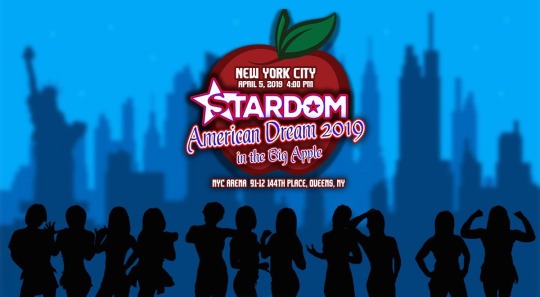
Wrestlemania was in New York this year (well, New Jersey, but you know what they mean), and since I live about two and a half hours away, I felt like I would be failing in my duties as a wrestling fan if I didn’t attend some of the related events. Make no mistake: I did not want to go to Wrestlemania itself, as the idea of sitting in a football stadium and squinting at a faraway shape that might be Buddy Murphy in the springtime chill is not high on my bucket list. But there were lots of other things to do, and I did very few of them! I did go to see the Stardom show in Queens and to WrestleCon in Manhattan, though, and herewith are my observations, jotted down for posterity and, hopefully, your amusement and/or edification:
FRIDAY
I think this is only the second time Stardom has run a show in the U.S., and it’s definitely the first time they’ve done it amidst the surge of popularity they’ve experienced in the GIF era. Although going to visit Hakujinjoe in Tokyo is a goal towards which I am even now socking away money, there’s no guarantee that I’ll ever actually get to see Stardom in Japan, and so this was the must-see event of the weekend for me.
This anticipation was accompanied by two apprehensions: First, my nature reluctance to drive in New York City, even in the outer boroughs. I live in the woods, and your city ways frighten and confuse me. Second, based on many of the US joshi fans I have encountered online, I worried this crowd would basically be a giant convention for creepers, perverts, rageaholic gatekeepers, scam artists peddling $300 autographed gravure DVDs, and people who seem to have only a dim understanding that the characters portrayed in the ring are not, in fact, identical with the women portraying them. Listen: I am not exactly Cary Grant when it comes to wit and charm, and just being an American who watches Japanese women’s wrestling puts me among a tiny percentage of hardcore nerds, so I hope this doesn’t come off as haughty. But there are good nerds, and then there are the nerds we encounter online way too often.
The first apprehension turned out to be baseless, as I got to Queens with plenty of time to spare and, like most joshi fans, headed over to the Rufus King Homestead on Jamaica Avenue for a tour of the mansion once owned by the fiery antislavery advocate and signatory to the Constitution. OK, so I was the only joshi fan who toured the Rufus King Homestead (in fact, I was the only person, period; Rufus does not get much love), but I still learned a lot. Rufus King used to loan money at exorbitant rates to local farmers who owned slaves, and when they couldn’t pay him back, he’d accept the enslaved people as collateral, only to immediatly free them. Rufus King, Loan Shark For Justice!
It turns out the second apprehension was also baseles, because the crowd turned out to be full of awesome people. Really friendly, outgoing, and super enthusiastic nerds, the best kind of nerd, really. The dominant attitude was not, “Oh you like Stardom? Name five of their faction drafts” but “I can’t believe we all get to see this awesome show together.” It was also, by a country mile, the most diverse indie wrestling crowd I’ve been part of, and about 35-40 percent of the people in attendance were women, which really made the whole experience better. I’m not saying everyone was awesome, but it was definitely a fun group of people to be part of for an afternoon. I am ashamed that I assumed it would be full of unbearable dweebs.
So, that out of the way, here’s the highlights of the show, in the time-honored spaghetti Western sytem of categorization:
THE GOOD
Momo Watanabe vs. Utami Hayashishita: Easily the match of the day, and one of the best matches I’ve seen all year. The Queen’s Quest teammates were batling for Momo’s Wonder of Stardom title, which she won from the departing Io Shirai last year. I don’t just like Momo, I identify with her image as the studious but introverted nerd kid who thinks hard work and playing by the rules is enough to guarantee success, only to be constantly frustrated as flashier peers take shortcuts to the top. The tension between these two has been building since Utami’s debut last year and subsequent mega-push as The Big Rookie and Utami All-the-Belts. Momo, who put in years of quiet, dedicated work as Io’s understudy, is in danger of being usurped as Queen’s Quest leader by the newcomer before her tenure has really even gotten under way. This is a great basis for a wrestling match, and these two, aware they were in front of their biggest audience outside of Japan not just in person but watching on Fite, rose to the occasion. I’m terrible at describing wrestling matches, but this was a nailbiter full of near-falls and what-will-it-take kickouts that felt earned rather than slathered on. It helped that the crowd was rabid, with Utami having a slight edge, WHICH ONLY SERVED TO MAKE ME CHEER LOUDER FOR MOMO. I honestly had no idea who was going to win: normally you’d know the champ would retain in an away match like this, but having their second most important belt change hands would also have been a great way to make a splash in their New York debut. In the end, though, Momo retained with her Peach Sunrise finisher and I LOST IT.
Stars vs. Oedo Tai: The villainous but lovable Oedo Tai were over like crazy with this crowd, and people went bananas when they came out to do their pre-match war dance. They could have basically just done that and most people would have been, but they had a fun elimination match with the Stars faction. A lot of zany action in this and a genuine surprise elimination of Kagetsu midway through. The only missing piece of the puzzle was Sumire Natsu, who didn’t come over with the company, possibly because she’s a freelancer. She made appearances at Tokyo BDSM clubs instead during Mania weekend, which is the most Sumire Natsu thing ever.
Yurie Kozakai doing the ring introductions: Stardom was really smart about the idea that they were giving fans in New York “a real Stardom show,” and having the promotion’s normal ring announcer introduce the wrestlers was a perfect touch.
Hana Kimura: The newest Stardom signing looked like a superstar and basked in the crowd’s adulation during a three-way tag match that also involved Konami and Bea Priestley (making her US debut?) and Britt Baker and Brittany Blake, who should have called themselves the Britt-ish. No? I’m - I’m [putting my finger to my ear, like I’m listening] I’m being told “No, they should not have called themselves that.” Anyway, the match was fun but insubstantial, but Hana’s charisma is off the charts.
THE BAD
IPW:UK ran a show at the venue (the NYC Arena, which is an arena only in the sense that a mid-sized nightclub is an arena) right before Stardom, using House of Glory’s ring (the compromises and arrangements of Mania Weekend!), and the bottom rope broke. The effort to fix the broken rope was mostly unsuccessful, and also delayed the opening of doors at the venue by nearly an hour, meaning 600 hearty nerds were standing in line in 39 degree weather, with sleet pelting us. The paperback I had brought to pass the time in line was USELESS. On the lemons-lemonade side of things, though, this did mean we were all in line when Stardom’s bus rolled up, and all the wrestlers disembarked to head inside. Big cheers from the crowd, which obviously delighted the wrestlers. “It’s gonna be awesome!” Hana yelled at us. It was! Once we got out of the sleet
The broken rope delay also meant they had to cut the already abbreviated (five matches) show short, and it showed. The first three matches were all obviously truncated, with the High Speed title match between Hazuki and Dust suffering the most for it. Don’t get me wrong, it was good, and I was impressed by Dust, who’s new to me, but it felt like they were just starting to get going when it ended. IPW:UK, YOU ARE NOW MY ENEMY. OR MAYBE HOUSE OF GLORY, I DON’T KNOW. SOMEONE.
THE UGLY
Maybe half the appeal of this thing was the promised meet and greet afterward, but the meet and greet was more chaotic and less organized than Kelley Square at rush hour (sorry, this is a Worcester reference, Worcester people will know this). Nobody seemed to know where to stand, lots of fans didn’t realize they had to buy little tickets before meeting the wrestlers, and as someone whose job sometimes involves putting up signs in medical buildings, the lack of even rudimentary paper signage was APPALLING. This did not stop me from getting nerdy fan pics with Hana Kimura, Kagetsu, Momo Watanabe, Mayu Iwatani, and Konami. Hazuki left her table before I could get to her, and this failure will haunt the remainder of my days upon this earth. Possibly. The wrestlers all had pieces of paper with common American names written on them, so they’d know how to address the autographed pictures, which was sweet. Hana has great conversational English. There was no line when I went up to Konami, which is preposterous. Konami rules, fellow nerds. The whole thing was nice, and the language barrier prevented any of that thing where guys try to unburden their psyches onto female wrestlers in a bid to make some kind of emotional connection. JUST SMILE FOR THE CAMERA AND MOVE ALONG, PAL.
Also, apparently the Fite stream was choppy as hell and cut out completely right at the end of the Momo-Utami match, and only came back after it was over. Glad I went in person!
In part two, we’ll cover the gregarious Jesse Ventura, the surprising lack of merch slingers at WrestleCon, and the puzzling fame of that fan who had a cardboard sign saying “FACE FUCK ME FINN” at a Takeover a few years ago.
8 notes
·
View notes
Text
idolish7 - Part 3 Chapter 15.2 Translation
Chapter 15.2 - A song linked to memories

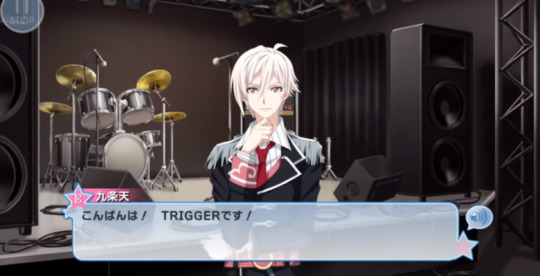
Tenn: Good evening! We’re TRIGGER!
Audience: Kyaaaa….
Tenn: I’m glad we can finally meet again. We’ll be singing with all of our might just for you!
Audience: Kyaaaa….
Audience: ….Tenn-kun…! Gaku-san! Ryuunosuke-san! I love you!
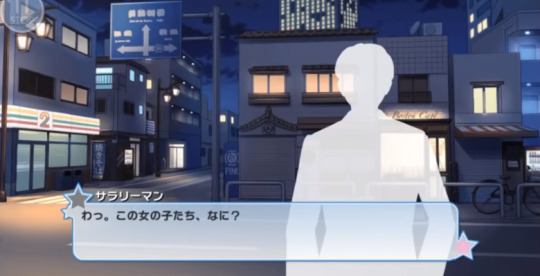
Salaryman 1: Whoa, what’s going on with those girls over there?
Salaryman 2: Maybe they’re spectators of that live house? Ah… TRIGGER is playing.
Salaryman 1: So it’s TRIGGER! It seems like they’re still popular. I haven’t been seeing them on TV lately, but I’ve been watching Yaotome Gaku’s drama series.
Security guard: If this many people gathered here, it may bother the residents of the neighborhood and the other people as well… If you don’t take measures, this could get troublesome.
Anesagi: I apologize for the trouble we have caused you…
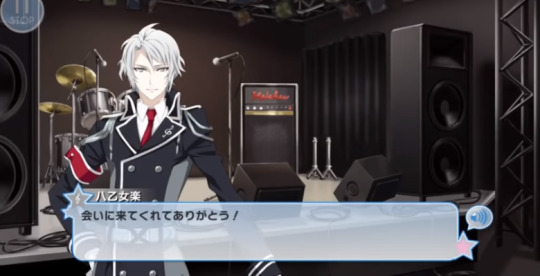
Gaku: Thank you for coming to see us!
Ryuunosuke: It’s incredible. The audience is so close that I can see everyone’s faces!
Audience: Kyaaaa….

Anesagi: Eh?! We’ll be prohibited from performing here?
Live staff: We’re thankful for the full house but… with just today, we really can’t meet the logistic requirements for TRIGGER’s lives.
Live staff: Even the police came several times to give warnings… You’re better off at a place with a much bigger capacity! I’m wishing you luck!
Anesagi: …

Mister Shimooka: That was IDOLiSH7’s “Sakura Message”!
Riku: Thank you very much!
Audience: Kyaaaa….
Woman 1: Apparently Riku-kun’s favorite food is omurice!
Woman 2: So cute! Hey, did you see this month’s magazine? When he tried making carbonara, he ended up boiling soumen noodles!
Woman 1: He was the one who said he ate together with Iori-kun, right? I want to see that! I wish they had a camera at their dorm!
Woman 2: ZOOL has gotten popular but somehow, they look scary so I couldn’t really get into them. Fufu… Riku is so nice!
Woman 1: He makes you want to cheer for him!

Iori: After MEZZO”, Nanase-san also received a radio work offer…
Iori: Seeing how he cannot talk by himself, it’d be better if he teamed up with someone else.
Tsumugi: The recording session will be done during the day but the show will be on air late at night. For this reason, I was thinking of someone outside you and Tamaki-san.
Tsumugi: Since Mitsuki-san is a regular on several shows, fitting his schedule will be difficult. That’s why I thought Nagi-san would be the best choice.
Iori: …Can those two really organize a show together?
Tsumugi: It’ll differ from MEZZO”’s soothing mood and I think it could become a fantastic show like no other before!

Riku: Good evening! This is IDOLiSH7’s Nanase Riku with…
Nagi: Hello~! This is Rokuya Nagi!
Riku: Here is our first postcard! The topic is “Methods to fall asleep when feeling sleepy”!
Nagi: Methods to fall asleep? Let’s see. In my case…
Riku: Hold on, I got it wrong! It’s “Methods to stay awake when feeling sleepy”!
Nagi: I lay down on my bed. See you next week!
Riku: Don’t end it already!! That won’t do! We want methods to keep our eyes open!
Nagi: You’re the one who mixed it up, Riku. OH… The postcard is so intricately decorated with colorful pen and yet you still read it wrong.
Riku: Hey now… It was my bad. I’m sorry.
Nagi: What else could the lady do even more for you to read correctly?
Riku: She could whisper softly into my ear.
Nagi: Nice idea! Let’s implement that. Very well, with your postcard in hand, dress up nicely and come to the broadcast sta--
Riku: Don’t say that! Don’t come, alright? Please keep sending in your postcards!
Nagi: Akin to a whisper in our ear, please decorate your postcards intricately, as intricately as you can.
Riku: Alright, for our next postcard…
Nagi: OH! Oh my god…
Riku: Hey now, don’t get so carried away on the radio! Ahaha! You’re infecting me. What’s up?
Nagi: We didn’t even spend a single minute to discuss the previous topic!
Riku: Ahaha! That’s true! That won’t do. Come on, methods to stay awake!
Nagi: At this point, I’m already wide awake.

Sougo: Continuing, let me introduce the next song. This song “Melody Blue” was released in 1982 by “Baby Beer”.
Sougo: It’s a hardcore masterpiece. The bass line is heart wrenching, along with the penetrating vocals and the mixing that--
Tamaki: What’s hardcore? Rock?
Sougo: It’s indeed rock. The most extreme type of rock.
Tamaki: Earlier you talked about al…. al…
Sougo: Alternative.
Tamaki: That, didn’t you say it was rock too?
Sougo: It’s indeed rock.
Tamaki: What exactly is rock? Is it something like humans?
Sougo: Humans?
Tamaki: Like if rock was like humans, then hardcore could be the Americans and Alternative could be the Japanese or something like that.
Sougo: Ooh, I suppose that is one way to see it. It… does feel that way. Everybody could be like rock.
TamakI: What’s with that category? Sou-chan, you normally go into details so wasn’t that too broad of an answer?
Sougo: It’s actually more convoluted than that and personal tastes also come into account, so it’ll differ from one record shops to another.
Tamaki: What about hip-hop?
Sougo: I believe that its roots come from jazz but there are thinking schools who say it comes from rock, so who knows? Hip-hop is quite divided.
Tamaki: Is it okay for rock to be such a broad category? Next time, can I compare salt, pepper and soy sauce to rock all I want?
Sougo: Not a chance. Those are seasonings.
Tamaki: Don’t mess with me! It’s unfair that only rock gets to do it!

Riku: Haa… I’m so tired…
Mitsuki: Are you alright, Riku?
Riku: Yeah. My body is in good shape. It’s just that my exhaustion finally set in when I returned to the dorm and saw everyone’s faces.
Yamato: Same here. I’ve been feeling really worn out.
Sougo: Once things settle down, it’d be fun if we could all go on a trip somewhere.
Tamaki: I want to go! Fall is probably impossible, then what about winter? How about going to Nagicchi’s country to see the aurora?
Nagi: OH! The cold in Northmare during midwinter is extremely harsh. The nights are long and the sun only rises for short hours.
Tamaki: Why? Is that place still on Earth?
Nagi: Iori, you’ve slacked off on teaching Tamaki geography, haven’t you?
Iori: Why did the blame have to fall on me?
Riku: How did the people of Northmare from the ancient times manage to live in such a cold place?
Nagi: Northmare’s ancestors were Vikings. During summertime, they invaded the neighboring lands and pillaged the food and treasures.
Nagi: During winter, they secluded themselves on a safe territory and awaited the arrival of minstrels.
Mitsuki: Minstrels?
Nagi: They are wandering singers who told tales through songs. During the ancient times in Northmare and the neighboring countries, tales were told through songs.
Riku: Tales through songs…
Nagi: They would typically be from the Codex Regius written in Old Norse or the Poetic Edda.
Nagi: Riku, since you’re an avid reader, in Völuspá… Perhaps you might be familiar with the seeress’ prophecy.
Nagi: It is a poem of a myth that tells from the creation of the world to the deaths of the gods. Would you know about it?
Riku: Ah! You must mean Ragnarök! I see, it’s from Norse mythology after all!
Nagi: Yes!
Mitsuki: Then, during winter, the wanderers who sang the poems of myths were anticipated by everyone?
Nagi: That is correct. When the rays of light cannot reach them and the world is buried in white, the people took joy in the songs and tales.
Nagi: And that is no different from this era.
Nagi: Even without needing to be cornered by blizzards, we still have sleepless nights when the heart is lost in a well of darkness where light can no longer reach.
Riku: I can understand… When that happens, Tenn-nii would sing for me. The songs had all sorts of stories associated with them.
Riku: There were the songs’ own stories and then there were the stories of the memories I had with Tenn-nii.
Mitsuki: I wonder if it’s the same with our fans. Just how many stories do our songs have with all the people who listened to us?
Mitsuki: Every time they listen to our songs, they’d recall the events of the previous day or something like that. It’d be great if we could connect to them this way.
Yamato: So songs are stories, huh… That must be why everyone holds TRIGGER dear. Momo-san holds Re:vale dear just as well.
Yamato: If we could no longer listen to a song that we associated to ourselves, the pain would feel like losing a part of ourselves.
Sougo: However, we will relive that feeling each and every time we hear it. Even the feelings that we forgot will resurface…
Iori: Happiness and sadness are two sides of the same coin… I can say this now but for some time, I didn’t have it in me to listen to “miss you…”.
Nagi: OH! For me, it was when TRIGGER sang “Natsu ☆shiyouze!” It felt akin to drinking a bitter cup of coffee.
Yamato: When I hear “NO DOUBT”, it reminds me of the time I was so overwhelmed that I caused a huge ruckus. It was so uncool, I should have learned to relax my shoulders.
Mitsuki: When we did a unit song with TRIGGER, we only kept good memories from that one, didn’t we! Those guys were so cool and we had a lot of fun.
Riku: When I was made IDOLiSH7’s center in “MONSTER GENERATiON”, I was so happy…
Riku: It felt like I was finally acknowledged but then a lot happened and I lost my confidence…
Riku: But when I sang “RESTART POiNTER”, I felt like I did grow up a little. I felt like I could finally forgive myself.
Riku: I love the members and the fans after all. I remember not to ever hesitate whenever I sing or listen to that song.
Iori: Nanase-san…
Riku: There was something that Tenn-nii told me a while ago. He said that even if the world was to stop spinning, it was our job to keep on singing.
Riku: When I first heard that, I thought that it was so sad that it had to be so harsh, so unforgiving and so difficult.
Riku: But I understand what he meant now. If our songs were associated to a good memory to someone or brought a happy story to someone, then…
Riku: Each time we sang, someone would be reliving their story. We can make them relive that feeling of joy and happiness.
Riku: Like a shooting star flying across a starless sky.
Riku: We can become stars or even a rainbow.
To be continued.
29 notes
·
View notes
Text
Bitterness in the Age of Fighting
I was excited when the first episode of Fighting in the Age of Loneliness appeared in my youtube feed last Monday, I’m willing to watch anything Jon Bois puts his name on right now. Most of his content is centered around American football and basketball and baseball, which is great, those are all sports I have watched at least semi-regularly at some point in my life, but for the past few years I’ve followed Mixed Martial Arts more closely than any of them. Felix Biederman, the writer and narrator of the show, was a new name to me: I know Chapo Trap House by reputation but the most I have ever heard of it is a few clips out of context.
That first episode did some strong establishing work to set the tone and context for the series, and then got to work telling the fascinating story of Brazilian Jiu-Jitsu and the Gracie family. It’s a story I know decently well, I think Felix did a good job of picking out the interesting characters and especially the moments of class struggle, and of course his words are backed up by the datawave audiovisual stylings of Jon Bois that we have come to know and love. The political ideas were more familiar and less interesting to me than the bits about fighting but I was curious to see how the show was going to try to draw connections and parallels between the rise of MMA as a spectator sport and the socio-political environment in which that rise took place.
I was engaged and I watched each episode as it came out through the week and by the end of episode four on Thursday I was starting to turn a little on the series. In this era of Youtubers with healthy Patreon support and good microphones I’ve gotten used to clear, smoothly edited, well recorded voice work and for me Felix’s narration falls short there, especially for a project with a major media company behind it. More than that, though, I was no longer on board with where the show seemed to be going, and I was worried that it would end on a sour note. I found myself agreeing with Felix’s political commentary but disagreeing more and more with his thoughts on MMA and the way he was choosing to frame the history of the sport.
The final installment disappointed me more than I had feared it might, enough to motivate me to make some kind of response to or critical reading of the whole series. Re-watching it with that in mind I (unsurprisingly) found more things I disliked. Fighting in the Age of Loneliness does an excellent job of telling the story of the ancestry, birth, rise, fall, second rise and anticipated second fall of the Ultimate Fighting Championship, but along the way it makes some pretty big missteps and takes some positions that I strongly disagree with. I’m not going to break down each episode individually but I do want to lay out the issues I have with the series and in particular dig in to the problems with the last episode. Towards the end I think I might even call Felix Biederman a fascist.
First, I want to provide some context for my own thoughts about MMA, and make some inferences and assumptions about Felix’s history with the sport that I think go some way to explaining why we see it quite so differently.
*
I am absolutely not a long-time hardcore Mixed Martial Arts fan, until relatively recently I didn’t have any interest in combat sports at all. Growing up in the UK around the turn of the millenium I was aware of boxing but only from a distance, it was already well on its way to fading from the forefront of the popular sporting consciousness, and my pacifist socialist middle-class parents certainly weren’t watching Mike Tyson fights. The first contact I had with what I would later know as MMA was a grainy video I remember watching on some pre-YouTube video sharing site as a teenager: a highlight montage of a man wearing black, red and white shorts kicking various different people in the head in various different boxing rings, with the same concussive effect each time.
I became more aware of the modern sport of MMA when I started noticing the UFC in mainstream sports media headlines around 2014. Three names kept appearing in those headlines: Jon Jones, for running into things with cars, Conor McGregor, for running his mouth, but most of all Ronda Rousey, for running through every challenger the UFC put in front of her. I suspect that there are a lot of newer MMA fans who, like me, were swept up in the hype surrounding Rousey and McGregor during that time, and stuck with the sport after they finally broke their respective winning streaks and came back down to earth.
Three years later even though I watch MMA most weekends and even though I have become almost as fascinated as Felix Biederman seems to be with the history of the UFC, the people who have fought in it, and the things that they have done to each other, I still consider myself a ‘casual’ fan. This is at least partly because when I think of ‘real’ or ‘hardcore’ MMA fans, I think of people like Felix, who have been around the sport for a lot longer and are, at best, skeptical about the results of its most recent jump in popularity.
Felix doesn’t explicitly talk about the genesis of his interest in the sport but there are hints in the text. The general tone of the piece goes from being detached and historical in the first episode to personal and emotional in the last, which I think is both a deliberate choice on Felix’s part and a reflection of his own experience. The third episode, when his narrative reaches the mid-2000s, is when I think it transitions from learned history to memory, and it’s around here that Felix starts making frequent references to goings on in MMA fan culture. If I’m correct then Felix Biederman has been following MMA for at least a decade longer than I have really known what it was. He has had the time to become emotionally invested in fighters and even the UFC as an organisation in ways that I am not, and of course his initial views on the sport were formed a relatively long time ago. MMA fights in 2018 don’t look all that different than they did in 2005 but the UFC has certainly changed a lot in that time, as have public awareness of and attitudes towards a new generation of combat sports stars.
*
That decade and a half of change in the UFC is the real focus of Fighting in the Age of Loneliness, but it presents itself as something much broader. The first episode is titled ‘The Invention of Fighting for Money’ and in it Felix makes a lot of sweeping statements about the past that don’t hold water. He very much tells the winner’s version of history, the narrative favoured by the UFC and the Gracie family, who would have you believe that they invented not only the modern sport of MMA but somehow the very idea of fighting itself. Felix remarks on the marketing and promotional skills of Rorion Gracie in the second episode without seeming to realise quite the degree to which he has himself fallen prey to them, and he also comes across as having the slightly fetishistic attitude towards East Asian martial arts that has become common in the USA over the past half century or so.
As he transitions out of the prologue, Felix says “the true catalyst for MMA as a sport, business and spectacle go back to Japan”, and when he goes on to describe the spread of Jujutsu from Japan to Brazil he says “after hundreds of years, Martial Arts had finally broken containment.” At the end of the series he proclaims that the “fourth era of fighting itself” is currently beginning and that the previous two ‘eras’ only lasted a handful of years each.
These generalisations don’t stand up to even the lightest scrutiny. The history of Martial Arts or combat sports or fighting or whatever term you care to use goes back much farther than feudal Japan, and some of the other things Felix says imply that he is at least partially aware of this. As he is giving his starry-eyed take on the life of Judo’s inventor he says “As long as there are people, they will at some point want the ability to keep someone from kicking their ass, no matter how unlikely it is that they will ever get into a fight.” It strikes me as particularly American that his argument in favor of combat sports being inherent to human society is based on the concept of self-defence. I prefer a line of reasoning that is similar but based on competition: As long as there are people, they will at some point want to test their wits and skill and strength against each other.
Indeed, the story as we know it of unarmed combat sports is as old as recorded history: there are images of wrestling in four thousand year old Egyptian tombs, and the classical Greek Olympics included an event called Pankration, which could be roughly translated as ‘fighting with all of your power’, that had an almost identical ruleset to early Ultimate Fighting Championship events.
Felix oversimplifies the history of fighting as a whole, but even if we just look at what he says about Mixed Martial Arts he gets it wrong. In episode one he says “The entire sport of Mixed Martial Arts owes its existence to Mitsuyo Maeda” and then in episode two he alleges that “A world where proto-MMA existed outside of gymnasiums in Brazil seemed pretty unlikely in 1976.” A corollary of my earlier statement might be that as long as there are people testing their wits and skill and strength against each other, there will be other people who think they can do it better. People have been pitting different schools of fighting against each other and amalgamating them long before the Gracie clan existed.
A decade before the date when Felix claims that mixed martial arts were confined to Brazil, Bruce Lee was blending Wing Chun with other styles to formulate Jeet Kune Do. A decade before that a Japanese Karateka was devising a ruleset which would eventually become Kickboxing to facilitate competitions between karate and Muay Thai. In the 40s the Kajukenbo school was founded in Hawaii with the goal of rigorously testing multiple fighting styles against each other to determine which elements of each were the most effective. In the 30s a Czechoslovakian Jew was refining the boxing and wrestling he had been taught in gyms into Krav Maga in brawls against anti-semitic thugs.
In Victorian London the Bartitsu school taught gentlemen a blend of five different fighting styles from around the world, while in the music halls exhibition matches pitted boxing against Savate. Savate was itself developed over the preceding century by efforts to find a middle ground between the heavy-booted street fighting style spreading from French ports and the Queensbury rules boxing that was popular in England.
Even the legend of the birth of Muay Thai, a fighting style which has had arguably as much influence on the modern sport of MMA as Brazilian Jiu-Jitsu, is a story about mixed martial arts: when the Konbaung Dynasty of Burma captured a famous fighter during their battles with Siam in 1767, they offered him the chance to win his freedom if he could demonstrate the superiority of his Siamese boxing style against the Burmese school, which he promptly did by knocking out ten Burmese opponents.
Felix contradicts himself on this topic in the first episode when he describes Jigoro Kano studying western wrestling and sumo to augment his Jujutsu training and develop Judo. In the second episode when he says “In 1993 no one knew anything, and most people still thought that if you did karate the right way you could blow up somebody’s heart” he is obviously being facetious but he is also projecting his own ignorance outwards. There has always been fighting, all over the world, and there have always been evolving schools of thought about the best ways to fight and the best rules for fighting as a sport. The story of Brazilian Jiu-Jitsu and the Ultimate Fighting Championship is captivating but it is not, as Felix presents it, the only story about fighting. In this regard, as with others, he seems to have internalized the some of mystique that the UFC has cultivated around itself and its history.
*
Once the history lesson is over I think Fighting in the Age of Loneliness hits its stride and Felix’s passion for the Pride FC and UFC fights and fighters that drew him into the sport shines through in the writing and the narration. His criticisms of the ways that the UFC continues to underpay and otherwise mistreat its fighters are spot on and if anything he could have gone into its anti-union policies in more depth. Before I get to the final episode, there are a few smaller criticisms I want to get out of the way.
Firstly, I would like to have seen more about modern women’s Mixed Martial Arts in the show. I largely chalk this up to the difference in perspective on the sport between Felix and myself: a female fighter was what drew me to watch the UFC in the first place so my image of the sport is one that has always included women, whereas Felix got his start watching Pride, which had no female fighters, and an all-male era of the UFC. There were women competing in MMA at that time and a few exclusively female promotions but if Felix ever watched any of them he doesn’t mention it. In the end, Ronda Rousey gets a minute and a half, Joanna Jędrzejczyk gets about 30 seconds and Cristiane Justino gets a name check.
Rousey is the only female fighter to be mentioned outside of the quarantined WMMA portion of the show, and she comes up during a rather odd accusation of nepotism that Felix levels at Dana White, one which I have heard from other longer-standing UFC fans. I am no supporter of Dana’s and I’m not seeking to defend his character, but it seems far more likely to me that the reason the UFC put so many promotional resources behind Ronda Rousey and Conor McGregor is not, as Felix supposes, simply because Dana White personally liked those two fighters, but rather because he saw the opportunity to make a lot of money off of them, which he did. Dana is a fight promoter, he is notoriously fickle in his affections and the warmness he displays towards any given fighter is directly correlated to their ability to drive pay-per-view buys for his promotion.
I also think that there are some more straightforward explanations for the UFC’s success than the poetic ones that Felix understandably focuses on. The ideas of the UFC as a refuge for outcasts and the alienated, both as fighters and as fans, and the honesty of single combat in an age of uncertainty are clearly very thematically important to Fighting in the Age of Loneliness as a project. For me the series places too much importance on the role those things played in the current popularity of the sport and doesn’t put enough emphasis on, or even mention at all, some more mundane but more significant contributing factors.
The vacuum at the top of combat sports that was created when boxing all but collapsed under the accumulated weight of decades of corruption and promotional malpractice, and the brief but significant success that the WWE had with a grittier presentation of professional wrestling in the late 90s both set the stage for the rise of modern MMA in the USA. That rise was helped along by things like the value of the walk-off head kick knockout and the fourteen second armbar victory in the age of the highlight clip and the animated GIF, and the mix of astuteness and good fortune that led the UFC to put out a reality TV show featuring actual physical conflict at a time when programming was being dominated by reality shows based on exaggerating and continually re-hashing interpersonal squabbles.
*
At the end of episode four, titled “As the world fell apart, the only magic was in the cage”, Felix’s rhetoric about the things that happen during UFC fights reaches its most florid, mythological heights. Against a montage of post-fight embrace photographs he says “The magic that we wish we saw everywhere else was in the cage [...] At least there was one place where unthinkable things actually happened, at least if you put two weird people with incredible abilities in front of each other their combined experiences and opposing martial abilities would create a beautiful, maddening story.” I am not criticising Felix for being more captivated by the emotion and passion of fighting than I am but the praise and reverence which he lavishes upon his favourite period of the sport’s recent history at the end of the fourth episode clashes brutally with the way he starts the fifth.
“No-one is ever content to just like something, especially not nowadays”, he says. “We’re not just fans of things any more. We declare our media consumption habits to determine the types of people we are [...] now if someone doesn’t like something we like they hate us” These lines and the visuals that accompany them are presented as a barb aimed at the legions of TV personality and pop star fans bitterly defending their territory on social media. Although there is a hint of self-deprecation about this segment I don’t read much self-awareness here, mostly just old fashioned middle-class punching down at the popular culture of the working class.
In the way he frames what he views as the best period of the UFC’s history, Felix is himself engaging in, as he puts it, “battles that our millionaire entertainers will probably never give a shit about or even find out about”. He has taken to the field of the culture war to defend his memory of a past version of a massive, sinister entertainment company against the changes that he perceives to be ruining it.
Here is where the bitterness begins to creep in, and build. Felix starts talking about the insecurity of modern MMA fans and the sport’s image problem, but then he abruptly dispenses with those concerns and starts arguing that MMA should remain insular and niche. A this point he also waves a huge screaming red flag by describing Jon Jones as a “weird person” who is “actually pretty fascinating once you get to know him” and who has “more depth than most would know”, but we’ll get to that later.
“Who gives a shit if we don’t have hundreds of millions of people watching with us every time, and why do we care if people think we’re fucked up or weird for watching it. We know what our sport is, and we know who we are [...] It’s our stupid violent insane spectacle sport for freaks and assholes that’s as legitimate or illegitimate as any other sport in the world. Well, at least it was ours at some point.”
I recognised this argument the moment I heard it. It sounds almost word for word like an insecure gamer defending video games as an art form and as a hobby that is just for real nerds and not the masses. I know that argument very well because I have been that insecure gamer in the past. In complaining that MMA is not “ours” anymore he has jumped from “if someone doesn’t likes something we like they hate us” to “if someone likes something we like for the wrong reasons they hate us”.
This is the tone that Felix adopts for the entire final episode, and he proceeds to decry three recent changes he thinks the UFC has made in an effort to bring the sport into the mainstream, changes that he declares as already being “to the detriment of the viewers, the fighters, and ultimately, [the UFC] themselves”.
The first is the Fox TV deal, of which his criticism is that it has led to too many fights and therefore too many fighters, but he doesn’t present any reasons why more fights has been a bad thing. He talks about how poorly the UFC compensates its rank-and-file fighters, which is a great argument for better fighter pay, but is not an argument for fewer paid fighters or fewer fight cards.
The second is the UFC’s apparel deal with Reebok, which he accurately assesses as a disaster for their fighters.
The third is drug testing, and for me this is where Fighting in the Age of Loneliness goes completely off the rails. The first thing he says in this segment is probably the only part of it I agree with: “the vast majority of your favourite athletes use steroids.”
*
Felix is right that the UFC asked the US Anti-Doping Agency to start testing its fighters more to provide an image of legitimacy than because they actually care about fair competition, but his main problem with the policy is that performance enhancing drugs are in fact cool and good. Earlier in the series he celebrates the way that Pride FC’s “loose medical oversight” and “pro-steroid policy” allowed its fighters to “consistently break laws of god and man,” now he gleefully exclaims that “Steroids are actually kind of amazing.”
“The human body is absolutely not designed to fight for 15 to 25 minutes, but steroids help make it work”. Felix provides no justification whatsoever for this claim, and it’s a ridiculous one that springs from the same myopic view of the history of combat sports that he expresses in the early episodes. To present just one counterexample, fighters in classical Greece did not have the benefit of modern nutritional science and training methods, let alone anabolic steroids, but the only time limit on Pankration bouts was sunset. Fights that last more than 25 minutes might not be the most fun to watch but they’ve certainly been happening since long before the steroid era.
Felix doubles down on this position. While he acknowledges that steroids “have their side effects” he asserts that “it is impossible to compete at the highest levels of fighting without some chemical help.” This is another absurd claim, he does try to back this one up but in doing so he immediately undermines it: “Talk to any retired fighter, and they’ll give a number anywhere from 75 to 90 percent of their former training partners juicing.” Rather than proving his point, this statement suggests that it is not at all impossible to compete at the highest levels of fighting without chemical help because at the very least ten percent of fighters are doing it. This scaled-back version of his original pronouncement does make the prospects of success seem pretty bleak for clean fighters, but Felix doesn’t care. He is happy to accept that if most fighters are doping then fighters need to dope to compete and therefore it is OK for fighters to dope.
USADA testing in the UFC has, in Felix’s opinion, fucked things up. There are a lot of very valid criticisms that he could make about the inconsistent way that the policy has been applied to different fighters or the odd ways it has conflicted and overlapped with state athletic commission testing policies or the lack of fighter engagement in the process of rolling out the program leading to confusion and uncertainty about the rules, but he doesn’t. Instead of talking about the massive unregulated supplement industry in the USA and the habit that some supplement brands have of ‘accidentally’ slipping a bit of the good stuff in their products to make sure that their customers get the gains they crave, he complains that fighters are being punished for “by-products of over the counter substances”. By-products and contaminants are not the same thing, I’m not sure if Felix just misspoke here or if he genuinely doesn’t understand the problem he is talking about.
He goes on to moan that the punishments for breaking the rules of the sport are longer under this new program. He doesn’t say why the longer bans are bad, just that the UFC has been ‘capricious’, and it seems obvious to me that the reason he disagrees with the longer bans is that he thinks PED usage is a good thing. Let’s address that idea.
There are two main reasons why I think performance enhancing drugs should be banned in almost all sports. The first is that PED use is bad for the long term health of athletes. We know that there are permanent negative effects associated with the use of anabolic steroids, and there are scores of other widely used PEDs that simply haven’t been around for long enough for the consequences of their use to be properly understood. It is possible to argue from this position for the regulation and standardisation of PED use in sports, and although I disagree with that line of reasoning I do think it has some merit, but there is no hint of this argument in Fighting in the Age of Loneliness.
I think the most practical way to prevent athletes from being incentivised to gamble with their future health for short-term gain, especially in a sport like MMA which already carries so much physical risk, is to ban the use of PEDs and enforce that ban with testing. Felix talks about steroids helping fighters to recover quickly from serious injuries, but I don’t think that is a worthwhile tradeoff to ask them to make, and I don’t think it would be a bad thing for the health of fighters if less prevalent PED usage meant that fewer of them had to endure the accumulated physical toll of fighting four or five times a year.
The second reason is a purely sporting one. The rules of all sports are arbitrary, but they usually constitute an attempt to delineate a competition that tests one particular set of skills and abilities in its competitors and excludes others. Chess is not designed to be a test of split-second reflexive reactions, 100 meter sprinting is not supposed to challenge your ability to predict the strategy your opponent is going to employ and prepare a counter-strategy, and as far as I am aware there is no sport that seeks to test its competitors ability to improve their bodies through medical intervention. I want the sports I watch to be fair competitions that are about what they are about, and Felix does too: he repeatedly praises the “truth” and “honesty” and “earnestness” of “what goes on in the cage,” but he fails to see how this contradicts with the idea of allowing the outcomes of fights to be heavily influenced months ahead of time by means of one fighter having access to less scrupulous, less restrained doctors than the other.
There is some nuance here around where you draw the lines between sports nutrition, necessary medical assistance and doping, but again Felix does not adopt a position so sophisticated. It’s been demonstrated in almost every popular sport that athletes with the help of an organised and scientific doping program have a significant advantage over clean rivals with similar levels of experience and training, and that’s not a contest I was ever interested in watching. Fighters shouldn’t use steroids any more than match sailors should use outboard motors, it is contrary to the very concept of the sport.
*
Felix isn’t just mad about USADA testing because he thinks steroids are nifty, though. He’s also mad that they took away one of his favourites. “At the absolute highest level of the sport, no-one was derailed by this as much as Jon Jones” This is another part of Fighting in the Age of Loneliness that emphasises the gulf between Felix Biederman’s perspective on the UFC and my own. He watched Jon Jones’ rise through the ranks and his multi-year reign as the consensus best fighter in the world, and was apparently completely captivated by it. In describing him Felix returns to the hagiographic tone of the third and fourth episodes, describing him as “a giant, freak athlete who did moves that he learned off of youtube to humiliate fighters we grew up with”, comparing him to Napoleon, calling him “a genius who can destroy world champions with stuff he saw in a movie, the equivalent to those savant kids who can hear a song once and instantly play it on a piano perfectly”
By the time I was starting to watch the UFC, Jon Jones had already sabotaged his career fairly comprehensively. I don’t know Jon Jones as a legend or a genius or the greatest fighter in the world because I’ve never seen the fights that earned him that reputation. Here are the things that I do know about Jon Jones, things that have happened or that I have learned about since I started following the sport:
Jon Jones is a homophobe. In 2012 Jon Jones crashed his car, plead guilty to driving under the influence, and received a slap on the wrist. In January 2015 Jon Jones tested positive for cocaine in an out-of-competition test and was issued a token fine. In April 2015 Jon Jones ran a red light and caused an accident involving two other cars that left a pregnant woman with a fractured arm, then ran away only to turn himself in after an arrest warrant was issued and eventually plead guilty to fleeing the scene of an accident, receiving 18 months of probation. In 2017 Jon Jones was given a one year suspension after testing positive for banned hormone and metabolic modulators, which turned out to be contaminants in an erectile dysfunction pill he had been given by a training partner. In 2018 Jon Jones tested positive for an anabolic steroid and was suspended again for 15 months.
On the front steps of courthouses Jon Jones is humble and apologetic, and in the immediate aftermath of being caught doing something he shouldn’t have he often talks about how hard the experience has been for him and how much he has learned from it and grown as a person. At all other times he acts as though the bad things that happen to him or around him are never his fault, that he has no responsibility to ever change or even reflect upon his own behaviour, as though in all these struggles he has been the victim of cruel circumstance and conspiracy.
The Jon Jones that Felix describes is not someone I recognise, and the way he describes him is concerning. “As we got to know Jon more, we saw his personal foibles, like his DUI arrest and rivalry with Rashad Evans” I don’t think that having a heated rivalry with a competitor is comparable with drunk driving at all, and in framing the incident this way Felix trivializes it. He does this again with Jones’ hit-and-run conviction, mentioning it in passing but quickly moving on to quip about how awesome Jones got at powerlifting in his year off. He calls Jones “a person with failings who sometimes acted like an asshole, got pissed off and said incredibly cutting things to his opponents”, reinforcing the impression that Jones’ main character flaw is simply being too fierce a competitor, instead of calling him, say, a person with failings who sometimes acted like an asshole, took drugs he shouldn’t and crashed cars.
Felix is constantly making excuses for Jon Jones in this part of the episode. When he gets to the second failed drug test, he says Jones “got popped by USADA”, a turn of phrase that subtly reinforces Jones’ own narrative of victimhood, especially since Felix has already established USADA as the bad guys who are fucking up the UFC. He wraps up the Jones segment with a ‘boys will be boys’ defence couched in another appeal to the glory of days gone by: “It used to matter less if you acted like an idiot. Everyone was a bit of an idiot in one manner or the other in life, but god forbid you now embarrass the sport”.
*
From here, Fighting in the Age of Loneliness whines to a messy conclusion. The segments get more disjointed, it’s at this stage that modern women’s Mixed Martial Arts gets all of two minutes of consideration, and then there is a rather reluctant summary of the UFC career of Conor McGregor, who Felix seems not to like. He certainly doesn’t describe him with close to the same kind of exaltation that he deploys earlier for fighters who had similar trajectories like Mauricio Rua, Anderson Silva and Jon Jones.
After that, Felix goes back to behaving like a fan of an indie band that has started making top 40 hits. He doesn’t like that the one of the UFC’s new part-owners is an asset stripping firm, even though in his golden age one of the UFC’s part-owners was an Emirati war criminal. Back in the first segment of the first episode he references “this modern era of fighting, where all of the things that used to make the sport unusual are mostly gone,” and now he returns to that idea and calls the supposed new “fourth era” of fighting “sanitized and oversaturated,” contrasting it with the “honesty of a fist-fight” and the “cultural haven for strange people” that the UFC offered ten years ago. He complains that there aren’t enough knockouts any more. When he brings up the recent long-anticipated fight between Conor McGregor and Khabib Nurmagomedov he says “sometimes the dam of normalcy breaks and we get momentary bursts of how things once were,” which strikes me as a rather ‘what have you done for me lately’ attitude to take about something that happened the month before this video series came out.
Things drag closer to an end and Felix keeps returning to his golden age. “What was once a weird refuge for those who needed it is now eroding into just another thing that’s as formless and indistinct as everything else. Fighting has rid itself of so much of its magic. It does not transcend the world any more.” The way that he constantly makes references to a bygone era when everything was simple and pure and good and as it ought to be, and wishes dearly that we could return to that era instead of continuing to face the injustices of this current moment in time, reminds me a lot of an ideology that has has a big resurgence in the USA recently.
The episode wraps up with one final spasm of bitterness. “This will happen to everything that you love. Nothing you like will remain untouched, and it will get further and further monetized into meaninglessness. This isn’t just our problem in our idiotic bloodsport. You’re fucked too.” He’s not wrong about the commoditization of entertainment and sports-as-entertainment but he sounds once again like a whiny gamer stereotype or a disillusioned popstar fanboy of the kind he mocks at the start of the episode.
And then the episode doesn’t actually end. The sort-of epilogue about Donald Cerrone fighting Nate Diaz seven years ago is a good little segment, but it doesn’t do anything here. It doesn’t serve to illustrate or emphasise any of the things Felix has been talking about in the minutes leading up to it, it doesn’t follow from them in any kind of narrative. It feels like a piece that some combination of Felix Biederman and Jon Bois just liked too much to cut, even though they couldn’t find a place to put it, so they stuck it here at the end. Maybe it is intended to provide some sense of denouement after Felix’s angry ranting. Regardless, it comes at the end of such an unpleasant half hour that its attempt at poignance failed utterly on me.
*
Felix Biederman likes different fighters than I do, he has a perspective on the sport of Mixed Martial Arts that often seems parochial and outdated to me, and I am puzzled by his obsession with the idea that combat sports athletes are all strange, broken people, but none of these things would bother me if Fighting in the Age of Loneliness did not present itself as an authoritative, comprehensive history of fighting, instead of what it is, which is the story of Felix Biederman falling into and out of love with the Ultimate Fighting Championship. Together with Jon Bois he certainly tells that story well, their collage of tales of societal fracture and political indifference with images of single combat is a powerful one, but in pursuing its thematic goals the series fails over and over to justify or interrogate the positions it puts forward.
If the UFC disappeared tomorrow, or if it had never been created in the first place, fighting would still exist, Mixed Martial Arts would still exist, the “one two path of a punch to a guy snoring on the ground” that Felix claims to adore will still exist. Fighting is exactly as magical and exactly as mundane today as it it always has been and always will be, even if Felix Biederman doesn’t enjoy watching it as much as he used to.
#Fighting in the Age of Loneliness#Felix Biederman#Jon Bois#SBNation#UFC#MMA#Chapo Trap House#Jon Jones#PEDs#Fighting#Combat Sports#Ronda Rousey#Conor McGregor
28 notes
·
View notes
Text
a bunch more asks waiting their turns so politely
These are all various asks about the likelihood of a remake, a rewritten season, or a spinoff.
1 could we get an alternate version
2 is a rewrite for S8 a viable option
3 would they change the ending for a spin-off
4 are single-episode edits possible for S8
5 will S7 reactions affect S8
6 how will DW get us to watch S8
Behind the cut.
With the shitstorm that vld became, would dreamworks ever take pity on us and remake some seasons of voltron that turned out like crap, or not even air, just release them as alternate versions on dvd? Im questioning the possibilities, not the probabilities, bc Im really not optimistic about that, I just wanna know if a show can do that and what would it take for the company to snap their fingers and be like "lets do it" (besides having money)
It’s not like frequent reboots don’t have precedent in other franchises; hell, comics do it on the regular. It’s also much cheaper to do a series of graphic novels or full novelizations geared towards an older audience. The problem there is that Dreamworks isn’t a comic book company or a publishing house; that part of the franchise would have to be farmed out to someone else.
My guess --- if another remake is ever a possible option --- it’d be several years down the road. The first version would be set aside as, say, the Y-7 version for kids and family, and then you’d find a new angle for the next version.
If DW got the impression there was a massive older crowd (say, 25-45) who would’ve eaten up a more mature, somewhat darker, version? Sure, why not try to grab that audience? I mean, look at the Castlevania series: it’s not pulling any punches on making clear it’s for adults. That would also require a different business model, since what adults like to buy for themselves is very different than what kids want. Skip the cake toppers, for starters.
do you think given the reaction to VLD S7, is a rewrite for S8 a viable option? I feel the fandom is divided about the general reaction to S7. If JDS and M can just [focus on the fanbase segment] that liked it, why [bother trying to fix it for those] that didn't?
Given what I’ve been seeing in terms of data from the season... I think they aimed to please everyone and ended up pleasing no one.
Pretty sure I’ve said something to this extent before: when you can’t please everyone, the answer isn’t to split the difference and piss everyone off. The answer is to pick your audience and give them the best damn story you can. The rest will sort itself out.
Let me put it this way: there are enough people who didn’t like S7 for the crummy animation, the OOC dialogue and actions, and the nonsensical storyline overloaded with a host of new characters that stole time from the actual protagonists. And there are also enough people who didn’t like S7 for queerbaiting the audience, killing off three out of four queer characters, and sidelining the one remaining queer character. There may be some overlap between those two sets, but taken together, those two sets are pretty much the dominant majority of the fan base.
I don’t know if that makes a rewrite a viable option, but it should be making a few execs think twice about letting the EPs/staff carry on in the same direction. I mean, you want a series to end on a high note, not an ‘omg that had such potential but boy did it self-destruct in the last two seasons’ note.
So if DW wants to do a Voltron spin-off, would they consider changing the ending to VLD to give Shiro the things he earned so this spin-off wouldn't be dead out of the water?
That would depend entirely on whether they’ve gotten the message that Shiro’s current status isn’t good enough for a significant part of the fanbase. If all they’re hearing (or all they choose to hear) is that it’s great to sideline one of their protagonists with no in-story explanation whatsoever, what’s to tell them there’s anything that needs addressing?
Additionally, if the entirety of the issue is Shiro --- and everyone else is just fine, thanks --- I’m not sure that’d rate as enough to warrant changing so much. More likely any spin-off would start some X length of time between, and we’d get an implied intermediary backstory (or even a mild retcon), and go from there.
Truth is, whomever gets the spin-off will (I really hope) be a better writer and not have to deal with intrusive newbie EPs. Even then, they’d be kinda limited on what they could do, given the spin-off does need to make sense placed against the first series. Then again, VLD hasn’t respected its own premise or continuity for the past few seasons, anyway.
So I guess there’s always the option to start with an episode that retells VLD’s ending... Kinda awkward, but not unheard of, to basically retcon a previous series out of existence.
I have no doubt DW is looking into what went wrong with this season. I know it might be a little to late to fix all of Season 8, but do you think they would have at least maybe the last few episodes changed to give a better ending to the show - or at least more respect to Shiro as a character?
Normally I’d say no. I mean, episode 1 should have characters making choices that in turn impact episode 2, and those choices prompt the events in episode 3... but that’s a logic VLD threw out the window somewhere between S3 and S4, and it’s only gotten worse since then.
In which case, oh sure, why not? It wouldn’t make any less sense than what they’ve already got planned, if S7 is any indication.
Could the reaction to season 7 cause any change the execs minds going into season 8?
One problem: this is a Dreamworks production, but it’s not a DW-owned story. It’s a franchise: there are other players involved. There are the two guys who first butchered GoLion into Voltron, Toei whose story got that embutcherment, Netflix as the distributor, along with Playmates and Lion Forge and other contracted partners. There’s a lot more people at the table than just DW.
It’s one thing for the EPs to say they messed up, and apologize. It’s quite another for Dreamworks to admit publicly their lousy (or nonexistent) oversight allowed the situation to happen.
Legal would have apoplexy, for starters. What wins you a franchise is often showing you have the confidence (if not sheer chutzpah) that you can do this job justice like no other. And then you hit S7 and must admit you hired people who made a complete hash of it?
If there’s anything that will cost the EPs any future roles of a similar position, it’s that they’ve put DW in a very uncomfortable position. Caught between a furious fanbase and overly-interested co-owners, someone --- or several someones --- are treading very lightly right now. They’re not going to forget the EPs are the ones who precipitated the whole mess.
I think we are in a unique situation where the fact that the EPs were vocal about [changing] VLD ... could be a blessing for us & DW. [But we know it] was changed, & DW's part seems to be more negligence than direct fault like the EPs. So DW can drop it or fix it, and a rewrite would be worth us sticking around, while restoring DW's name.
Again, that depends on whether DW is in a position that they can do so. I assure you they’d throw the EPs under the bus at the first opportunity, because that’s how the corporate world works. So their failure to do so is either because they don’t see the EPs’ actions as untenable (as far as we know), or because doing so would expose DW corporate to greater retaliation from elsewhere. (It could also be part of the agreement that these particular EPs are in place for the duration of the series’ production, too. Sometimes that happens.)
I still can’t get over the fact that the EPs were so blunt about having already had a script fully written when they asked to revise. From the Studio Mir leaks, we can guess at least some of the animation was already in production at least a year ago, or earlier. That’s a lot to redo.
Here’s something that only just occurred to me, when I listed the co-partners in this franchise: the Koplar brothers. These are the geniuses who figured they didn’t need to know Japanese to make GoLion into an american production; turns out they were geniuses on some level ‘cause it was a hit, anyway. They went on to produce Voltron: Fleet of Doom (1986), Voltron: the Third Dimension (1998), and Voltron Force (2011). If there is anyone at the table who’d be likely to have nostalgia goggles, it’d be the Koplars. This has been their ongoing story in one way or another for over 30 years.
Originally, the EPs said they weren’t tied to nostalgia; they weren’t going to redo the story as it was, but the story as they remembered. (I’d argue this actually indicates a stronger set of nostalgia goggles, but eh.) Their determination to get rid of Shiro has always felt like nostalgia goggles to me. Perhaps the Koplars were the greatest supporters of Keith as BP --- since that would respect the pattern they’ve followed, over and over, in all the iterations.
Considering the Koplar’s somewhat litigious background over Voltron ownership, they may’ve had the ability to overrule. So... if you want to bench Shiro, you pitch your work with the execs who are most likely to agree with you. And if you can do that in the window between the previous VP of TV retiring and a brand-new external hire coming on as VP... welp, you got permission, and the new VP may’ve signed off, not realizing the impact.
Which would put DW over a barrel, in some ways. If DW could’ve overruled their partners, the EPs never would’ve been able to make that end-run in the first place.
How do u think DW will try to get us to watch s8? They & the EPs have shattered our trust and the show is so messy its almost unsalvageable.
Stay to see X point's resolution?
Yeah, we stayed many seasons for nothing, next.
We have more rep? Ex. blonde girl is autistic...
So we should be scared for her too???
There's more queer rep?
Yeah, we heard that one already.
Unless everyone responsible is fired and a new crew runs the next seasons?
I don’t know. I would hope the answer is ‘by giving us a story that makes sense, and creates closure for all the protagonists, and not just by making two of them emotional rewards for two other characters.’
At this point, there is only one thing that’s going to make Dreamworks change course: if the fallout from VLD impacts its other projects. If the majority of the VLD fanbase up and announced it would be boycotting She-Ra or Fast & Furious or Trollhunters on the grounds that DW screwed up so badly with VLD that it cannot be trusted... Then you’d see movement. If the PR got so bad from so many upset and angry VLD fans that major news outlets paid attention and started writing articles about the situation, that would also put a black mark beside Dreamworks’ name -- and then you’d see movement.
With the VLD toys a failure (for whatever mismanaged reasons) and a financial model set entirely on toys, fixing VLD now would be throwing good money after bad. Unless, of course, there’s an impact beyond just this single series.
Until Dreamworks can see the impact in some concrete sense, they have far more to lose from their partners than they have to gain from their fanbase. It’s just how it is, with corporations in late capitalism.
You want to make an impact? You tell Dreamworks ahead of time, and then you follow through: pick a week and go silent. Nothing about VLD, here or on twitter or anywhere else. No reblogs on She-Ra updates. Ignore the podcasts. Don’t click on the articles. That stuff’ll be there when the week is over, after all. Show DW what it’s like when a fanbase checks out, by doing it. It’s a short-term boycott, but the reason groups do boycotts is because they work.
41 notes
·
View notes
Text
Wotakoi: Love is Hard for Otaku Review – An Adorkable Anime
Wotakoi: Love is Hard for Otaku is a refreshing twist on the romantic comedy genre featuring a charmingly diverse cast and relatable interactions that make for some of the most “realistic” relationships in anime.
The show follows different otaku in various casual and romantic situations. The plot might initially feel somewhat mundane compared to more story driven romantic comedies like Toradora, however this actually lends itself to one of Wotakoi’s greatest strengths. By grounding itself in reality more than most romcoms, it is able to ironically stand out similar to how Tsuki ga Kirei is noteworthy for wholesome middle school innocence. Characters go about their daily lives working in a traditional office, juggling work with their personal lives, and doing their best to foster relationships.
Choose Your Character
Narumi, a closet fujoshi, and Hirotaka, a hardcore gamer, are the title couple. Entering a relationship so early in the show let Wotakoi focus on more engaging character and relationship developments as opposed to leaving viewers hanging with a slow drip romance culminating in a cliché kiss near the finale. Meanwhile, Kabakura, a more casual bishojo otaku, and Koyanagi, an intense cosplayer, are already in a relationship for some time at the start of the anime. Their initially volatile relationship juxtaposes Narumi and Hirotaka’s laid back approach to dating, making for more varied moments.
A third pair of characters rounds off the small cast later in the show. Naoya is Nifuji’s younger brother that gives otaku activities his all despite being a “normie,” and Kou is a very quiet introvert that expresses herself through games. Unbeknownst to Naoya due to her short hair, Kou is a girl. Their almost inevitable romance provides a more traditional approach to anime relationships in terms of oblivious behavior regarding feelings and slow developments.
While there are no characters outside of the three couples, barring a few exceptions where forgettable one off characters say a few lines, Wotakoi has enough material to work with that more characters aren’t necessary. Most of the enjoyment stems from the eccentric cast coming together to play games, drink, or just even talk at Starbucks.
Love is Hard for Everyone
Solid character development is apparent for the entire cast throughout the anime. Kabakura for instance sheds his tough exterior to reveal more of his tender side. His hot and cold personality, clashing with Koyanagi, and being a great wingman for Hirotaka will likely make him a fan favorite character. Narumi on the other hand becomes more comfortable expressing her otaku interests thanks to her new friends. Wotakoi’s purity makes you want to root for the characters, outside of a few distasteful, but typical anime jokes.
The colorful cast enjoying manga shops, video games, drinking, and more give viewers the sense that there’s nothing wrong with being an otaku and people shouldn’t feel ashamed to be one. While otaku are far more prevalent in Japanese than American culture, this underlying theme is subtle. Viewers don’t need to have any geeky interests to enjoy the anime, although many jokes might fall flat.
Episodes for the most part are divided into two segments with the best episodes being one long segment. The longer segments allow some of the show’s diverse settings like the amusement park to shine, giving the writers additional opportunities for clever jokes and gags. A few segments drag on and rely on less effective jokes. However, the better segments overshadow them.
Whether the characters are walking in the rain or reminiscing about the past, nothing feels forced, adding to the natural developments between characters and their relatability. These aren’t people that one day suddenly decided to fall in love and everything is perfect. Wotakoi exemplifies the often-slow awkward nature of relationships that many people find themselves in before becoming more comfortable around each other.
The Sounds and Visuals of Love
The show’s cute, catchy vibrant opening is hard to skip. Narumi, Hirotaka, Kabakura, and Koyanagi show off some dance moves, along with different clips of the characters in their otaku habits, and the cast simply going about their daily lives. The animation is crisp and detailed before declining somewhere later in the anime. That being said, the drop in quality isn’t a detriment to the series since Wotakoi isn’t an anime you watch for visual splendor, but for the cast.
The ending sounds nice, although it isn’t as catchy or visually remarkable as the opening. Viewers will likely skip it after listening once in order to get to the next episode faster.
Lingering Feelings
Wotakoi is a treat for fans of romantic comedy. It is a great entry point for people reluctant to watch romcoms because of the minimal number of over the top cliché romantic moments. For example, characters do not dramatically rush to catch their love interest before they take a plane, move, or make some sort of questionable love triangle decision that divides viewers into determined support groups.
There is hope for a second season since the anime ended so naturally. I can only assume it followed the manga and didn’t force an original ending. For fans eager for more Wotakoi, they can jump into the manga. Otherwise, replay that opening and learn some new dance moves. Just make sure you have a partner to do them properly.
span { display: block; } h2 { text-align: center; } h2 { border-top-style: solid; border-right-style: solid; border-bottom-style: solid; border-left-style: solid; }
Score
table, th, td { table-layout: fixed; border: 3px solid #6698cb; border-collapse: collapse; text-align: center; color: #545454; }
Good Bad Character Development A Few Dud Segments Mostly Grounded in Reality Animation Declines Later On Natural Development in Relationships Catchy Opening
h1 { text-align: center; color: #5a5a5a; }
- 8/10 -
4 notes
·
View notes
Text
Ghostwriter Chapter 4
As much as I would have liked it too, my life did not slow down once I began work for BTS. Day in and day out, we are always on our feet; the boys practice every chance that they get and there is not a moment to even take a break, let alone write a single song. No wonder they went looking for help, every morning we get up before sunrise and every night we end up getting home after the vampires come out. I mean, geez! I thought to be an intern was hard, but I think I'd rather be unpaid and manual labor than do what they do every day.
The work isn't the problem though, every chance the boys got to spend time with me, they did so I could get a better idea of who they are as people. There have been plans canceled and even throwing me in some dressy clothes and making me tag along to big events like celebrity parties. Not that they wanted to go to those either. Suga's face told me that he hated how much a party would turn out to be, but after a party one night, the boys started drinking with me around and I did get out a few little secrets from them.
They each have a girlfriend although I have not met any of them yet. Some of them sound just terrifying though. Suga told me about his girlfriend who was also a Korean Popstar by the name of Mi-Ok, but her stage name was Sinbi which went with her Lolita style (apparently). The thing is that each guy described Mi-Ok as the type of girl who doesn't take very well to being told what to do and they say she is pretty scary with her popstar mask off (she has resting bitch face or so they say).
Jimin explained to me that his girlfriend was a Social Media Consultant and that I would meet her pretty soon. Her name was Mun-Hee and she was some kind of genius. She had finished all of her school by the time she was sixteen and was on the board of her father's company, Bumonim Eum-Ag. That's terrifying to think a girl, not much older than me might I add, sitting on a board and bossing people probably twice her age around.
Namjoon is dating an American girl by the name of Shayla and he explained to me that they had collaborated on a couple of songs before deciding to become a couple. He told me that she was a very relaxed person and went with the flow of the conversation, but that didn't mean she wasn't ready for a fight whenever the time came. He told me that she was having trouble back home with another producer and that I probably wouldn't meet her for a while. The look in his eye though, it held some much affection when he spoke about her.
Eun-Yeong was Jin's girlfriend and she is probably one of my all-time favorite models; he explained to me that she was always busy and he didn't get to see her as much as he wanted, but he was enduring for the time they could actually spend together. She's apparently a force of nature, a real advocate for what she wants and what she believes should be done for future generations of women. She has family troubles, but she pushes through and that's what he wants to convey to her in a song.
J-Hope is with a Latina girl by the name of Carina and he showed me a couple of dances they did together for Carina's dance studio. She was accepted into an academy here in Korea when she was younger and she built herself up from scratch to be able to be the best of the best. I smile as I would watch as I saw his face grow brighter and brighter with each move on the screen and I couldn't help, but notice everyone looked so proud to talk about their girlfriends.
V was dating this girl by the name of Maggie Cho and she was also American, she was their primary translator whenever they needed to travel and Namjoon wasn't around. She's apparently a very shy girl and that's why I haven't met her either. I get a strange feeling these boys are just trying to hide their girlfriends from me, but I don't quite understand why they would do that.
Jungkook is the only one who wasn't really looking for a relationship right now and that is what is going to make writing the hardest on me. Sure, I can take the words that each one has told me about what they've endured with their girlfriends, but it won't be the same as them actually writing the song for them. Jungkook can't even tell me he wants the song to be like, he just said that I should think about how my body would "move for a guy." What do you do with that!?
I sigh to myself as I go over the day's events once more, looking at the notepad in my arms. I adjust my heels, trying to get inspiration from the simple white stilettos, but that pain was nothing about love or body. In fact, even wearing heels is like hating your body, but they're just so damn cute, I can't take it! Scribbling out the words of pain from my blisters, I sigh as I try to think of words to describe love, but what is love?
I've never been in love, only the idea of being in love. Groaning, I switch the notepad behind the tablet I was given that contains today's schedule. The boys were recording an interview and I was traveling with them as their Administrative Assistant to understand who they are as people to be able to write the songs they asked me. We've been up since like five in the morning and I'm already exhausted at ten thirty this morning. They all had to get ready and chastised me as I was getting ready in the car because I held them up, all in good fun though.
I watch them smoothly talk through the interviewer's questions, giving just enough to show who they are, but not enough to ruin the image they've spent on for the last five years. Before bed last night, I decided that I needed to get to know the fans and the boys better with my own research. Apparently, their fans are called ARMY and they have the strongest passion out of everyone for BTS to succeed.
I look down at the schedule in my hands again, noting that our day is packed until at least midnight, if not longer. Every day, these boys are working hard for their fans and for their dreams. It's hard to believe people so young have such an impact on other people's lives. Sighing to myself, I begin to doubt my talents once more.
I have no sense of rhythm and I can hardly rhyme, but when I write, it flows from my fingertips on to a page. Watching the boys clammer off stage in excitement, I place a smile on my face as I had each boy a bottle of water.
"Great job out there!" I praise them, looking at the schedule, "We'll get you guys some food while we wait for the car to come and get you. Apparently were filming something else today...?" I murmur, looking it over.
"It's an episode of Run BTS!" J-Hope informs me, quickly finishing his bottle of water. I look at him with a confused look, scrunching up my eyebrows, "You're really not involved in popular culture, are you?" He teases, grinning at me.
"...I can tell you about American tv shows, some Japanese shows, and Korean drama, but..." I sigh, rubbing my head, "I know absolutely nothing about music."
"I heard you singing in the bathroom this morning," Jungkook pipes up and I can't help, but laugh a little.
"An opening theme song..." I tell them sheepishly. Before our playful banter could continue, my attention was taken away by a tv manager.
"Ms. Tsukamu!" The manager calls, running over to me, "Sorry to bother you, but I need to discuss a few things with you..." The manager takes me away from the group, but I wish I wasn't doing this alone. My head can barely wrap around what has happened in the past week, let alone what I have to say to this manager.
After we finish up at the studio, we make our way to the next stop: filming for Run BTS apparently. Everything is going so smoothly, I figured that the day would end on a high note, but boy was I wrong. We spent hours watching the boys fight in a kimchi battle and eventually, the losers are supposed to clean up. Sadly, Jungkook, J-Hope, and Jimin are the losers and take three years to clean up. While we stand off to the side as these boys begin their punishment, Namjoon pulls me close to him so he can talk to me quietly.
"Have you started on a draft yet?" He asks me and my stomach literally drops to my ankles. At the anxious look on my face, he gives a small sigh, "We can't expect you to be on our level after just a couple of days of spending time with us, but you should have some sort of draft."
"We've just been so busy and I know that's not an excuse-" I began to explain to Namjoon, but he holds up his hand for me.
"I thought what we told you the other night would've helped." He sighs as the boys finish up cleaning.
"You ask me to write a love song based on your experiences," I try to explain to him the impossibility of it, but he just shakes his head at me. Quietly, the eight of us move into the van and head back to our home. Filming had taken all day, so we had to push most of today's events to tomorrow. I glance at the clock on my phone and sigh; eleven fifteen... Where has the day gone?
When we arrived home, everyone began to trudge their way back to the bedroom. Well, everyone except for me; as I watch them all go to their respective rooms, I sit down on the couch taking off my pain filled heels and I stare at the blank tv screen. After only a week of staying with them and I still am not up to par for any matter.
Begrudgingly, I walk into the bedroom I was sharing after making sure both boys were decent and awake so I can grab my pajamas. After grabbing the shorts and the t-shirt, I walk into the kitchen, pulling out one of the tiny cakes I had bought the other night. Moving to the kitchen table, I start to nibble on the sweet treat while staring at the notepad once again.
"Heartbreak..." I whisper to myself, "Enduring... First... Unrequited... Self... Body..." Sighing, I begin to write down whatever came to my mind, but I was a novice when it came to anything about love. I know family love, but I can't even explain all of that... I really am totally useless, aren't I?
Hours seem to tick by as I sit and stare at the scribbles and marks on the notepad, but nothing is coming to me. Usually, when I write, I just let my hand do all the work and let the words flow right out of me, but I just can't write anything that's worthy of being called a love song. How do you even write a song? How do you even write in general?
Frustrated, I throw the pencil down and lean back in the chair. For the first time in a week, I felt like crying again. I can't compete with a global sensation of a boy band; they would get better work from a slug than they would me. I've had script after script thrown back into my face because it wasn't "original enough" or "the characters didn't feel real." The best comment was when a teacher of mine looked over one of my writings for me and told me that I should, "look into a new career path" because I didn't have the talent. I should've just listened to her, but I continued pressing forward, hoping my dream could come true in South Korea. I should've just stayed in Japan and became a simple office work.
My prideful tear ducts refused to let loose even one tear, but I felt the turmoil of emotions turning into my stomach. Everything going on made me feel like I was going to throw up and I was just about to give up for the night when I felt something cold touch my forehead. Blinking my eyes open, I look to see a glass of water above me.
"You need a break," Jungkook informs me, setting the glass down and sitting across from me.
"I'm sorry, did I wake you?" I put on my best smile, taking the glass gratefully as I sipped on it.
"I needed some water and noticed that you were still up," He shrugs his shoulders, drinking his own water.
"I didn't even hear you come in." I realize as I look at him in mild surprise.
"You looked like you were having a moment, so I thought I'd leave you alone for a bit." He chuckles, turning to look me in the eye. His gaze became serious as he steadily held my eyes with his own, "Are you alright?"
Trying to play it off, I smile at him and take a big gulp of water to will my emotions back into their container, "Never better!" I chirped quietly, maintaining the smile.
"You can't bullshit me, you know?" He leans back, crossing his arms. I tilt my head, raising an eyebrow.
"Now, why would you say that?"
"Because you're not okay and you're not fine," He huffs, "You've had the same fake smile on your face since we left the studio. You wanna tell me what's going one?"
For a moment, I felt my smile waver and I was about to spill my guts, but I just can't do it. Feeling overwhelmed by my emotions, I just shrug my shoulders at him, "I'm a little homesick, I guess."
He gives me a look that tells me he's not buying what I'm saying, but I still can't bring myself to saying anything. Quickly, I stand up, making the chair squeal underneath my weight. Giving an awkward cough, I head towards our shared room.
"You can't keep lying. You wear your heart too much on your sleeve," He whispers, but the quiet room allows it to catch my ears. I turn to him and give him one more smile that I could muster up.
"Just because I don't say anything in confirmation, doesn't mean that I'm okay," I mumble to him, "Are you going back to bed?" He shakes his head and I nod mine in return. Quietly, I crawl into bed next to Chi-Chi and fall into a deep, restless sleep.
The next day, we all scramble out of the room and head back to Big Hit Entertainment to discuss the day's plans. The boys haven't eaten, so when we arrive, I retrieve a tray of food that was prepared for them and it was set out in front of all seven boys and all four managers. Just as I was about to leave, Jungkook grabs my arm.
"I have something I want to talk about," He sighs loud enough to catch everyone's attention. He releases my arm and clears his throat awkwardly, "I think, because she's so inexperienced, that Sakka has hit and writer's block."
"Jungkook." I hiss at him a warning tone, but he ignores me flat out.
"So, I want to work with her," He says, cooly. The words that leave his mouth are so nonchalant, I don't think they processed in everyone's minds until a moment later. Nobody made a sudden move and I couldn't help shouting out my response.
"What did you say!?"
________________________________________________________
Author’s Note: I don’t own BTS, but I do own Sakka and her companions. This is loosely like Voltage’s Scandal in the Spotlight and anything associated with that I do not own
#bangtan#bangtan fanfic#bangtan fanfiction#bangtan imagines#bangtan scenarios#bts#bts imagines#bts jhope#bts jimin#bts jin#bts rm#bts suga#bts v#bts jungkook#jungkook fanfiction#jungkookie#jungkook fanfic#jungkook#jungkook imagines#namjoon#jin#jimin#taehyung#yoongi#hoseok#seokjin
3 notes
·
View notes
Text
Jon Writes a Year-End List
My favorite songs of 2020, alphabetically by artist
Bedouine (Margo Guryan cover)- The Hum
The original Guryan version is good but Bedouine’s take is cleaner, all the better to emphasize Guryan’s blissful songwriting. I could listen to the chords in the chorus forever.
Bob Dylan- I’ve Made Up My Mind to Give My Heart to You
It’s nice to hear Bob sing a yearning and clear-eyed love song. And the way he stretches out his words gives the whole thing a confidence that’s easy to get lost in.
Boldy James- Giant Slide
Boldy had a great year, and it’s The Price of Tea in China with Alchemist producing that stood out to me.
Empty Country- Becca
I don’t go to music festivals anymore, but listening to this album makes me dream of hearing it live, while being dehydrated, sweaty, feet hurting, holding in a p*op, a late afternoon sunburn loading. I want the whole thing!!
fawning, Rui Gabriel ft. Jack Riley- God
Toss it on the cloudy day walking playlist!
Frances Quinlan- Went to LA
Great cathartic yell in this one. Quinlan builds up a palpable tension here. It rocks.
Judy ft. Jack Dolan, jommis- Say What U Mean
You’ve got to imagine these fellas knew they had put a few catchy melodies down while trying to out-croon each other.
Kurt Vile ft. John Prine (John Prine cover)- How Lucky
A Prine acolyte with a feature from the man himself. RIP.
Lala Lala, Grapetooth- Valentine
Kind of like a slow-dance song at nightmare prom. I love the percussion and Frankel’s villainously-low voice.
Lil Durk- Street Affection
The range of emotions Durk can access and scroll through is impressive.
Miranda Winters- Little Baby Dead Bird
Scuzzy guitar and violin create a hypnotic effect in this evocative dirge. Miranda Winters is such a good singer. Check out her main band, Melkbelly-- they put out a great album this year!
Nap Eyes- Mark Zuckerberg
Two guitars: one is pointy, the other is chugging. That is the correct way to do two guitars.
Noname- Song 33
This song is 70 seconds. 70! Noname casually negates J. Cole and the song isn’t even about him. She’s so great.
Ratboys- I Go Out at Night
Julia Steiner is on her The Hours shit in this melancholic fantasy of leaving and not returning.
Rio da Yung OG, Lil Yachty- 1v1
I like how Yachty comes in on his verse! It’s been fun to see him back in action with his new Michigan friends. Rio is the star here, though. And Enrgy too.
Soccer Mommy- yellow is the color of her eyes
Sophia Allison’s delivery of “The tiny lie I told to myself is making me hollow” might be my line of the year.
Swamp Dogg- Memories
The whole of Sorry You Couldn’t Make It is great, but for Swamp Dogg, who has covered John Prine, to work with the man before he died is a special accomplishment, and we’re better off that it’s recorded.
Tall Juan- Irene
One of my favorite 2020 releases. And I’ll be a bit vulnerable here folks….when I am walking outside and this song comes on, I push my butt out a little bit and walk like I have rhythm and purpose.
Tierra Whack- Dora
I’m so excited to see what Tierra Whack does, from her beat selection to how she jumps between flow and cadence. She understands herself so well.
Non-2020-specific Music I Enjoyed, in Superlative Form
Group Vocal Performance Most Likely to Pierce Your Heartless Facade
Yesu Ka Mkwebaze
Best Song to Listen to if You are an 1850’s-era whaler in Your Feels
Mary Ann
Favorite Duet (Not Blood-Related)
Emmylou Harris and Herb Pedersen (but mostly Emmylou) create such an intricate and gorgeous melody on “If I Could Only Win Your Love”. Pedal steel heads and mandolin freaks, eat up.
Favorite Duet (Blood-related)
The Louvin Brothers- When I Stop Dreaming
Any longtime friends of the show know I’m a big fan of the singing duo The Louvin Brothers. They’ve got that golden country tone but it’s the blood harmony that turns these guys into something else entirely.
And here’s the kicker, folks. Emmylou covered When I Stop Dreaming! How coincidental for all of us reading this End of Year list…. The Louvins are my preferred version, but Emmylou, that you could help me make this connection is enough, dayenu!
Most Surprising Use of a Song in a Network TV Show
"Yama Yama" by the Yamasuki Singers, Fargo Season 2
When I was a dishwasher at St. James Cheese Co., late 2016ish, this CD was in our back of house music rotation. It is a magical album-- a Japanese children's choir with French pop production (think a bunch of bells and shit). I never learned the name of the album while working there and it fell out of my mind until years later when, after remembering how much I loved it, realized I had no idea how to find it. The pain of typing different spellings of “japanese children’s choir” into google for days on end.....I literally yelled when Fargo used this in its Season 2 big boy shootout. *chef’s kiss*
Best Album by a Spiritually Hungry Musical Genius, Lapping Her Contemporaries in Arrangement, Theme, and Songwriting, Gone Before Her Time
Judee Sill’s self-titled debut.
Best Use of a Second Keyboard in A Keyboard Solo
Fountains of Wayne’s Red Dragon Tattoo
Do I mean to say synthesizer? Not sure. RIP Adam Schlesinger and long live FoW. What a loss.
Best Vibes/ Song I’d Most Want to Show Ezra Koenig so That We’d Bond & Become Friends
Zibote
Best Lyrics Written by a Jew in 1920’s NYC Being Sung by Willie Nelson
Lonely rivers flow to the sea, to the sea / to the open arms of the sea
Favorite TV Shows
Ramy
-Second season shook its focus on the titular character and oh am I thankful. Not that Ramy himself isn’t great, he is, but the entire cast here deserves attention. The Uncle Naseem episode. The Uncle Naseem episode. Ahem. The Uncle Naseem episode.
Joe Pera Talks with You
Lovecraft Country
-Small gripes and complicated plotlines aside, this anthology connecting gothic horror, racism, and American history is phenomenal.
Small Axe
-The second installment in this series, Lovers Rock, which takes place at a party, is the vicarious shot in the arm you deserve, you little extroverted thing you.
I May Destroy You
Betty
The Last Dance
-The first Bulls game I ever went to was the first game *without* Michael Jordan, at the beginning of the ‘98-’99 season. Bad timing.
The Chi
Schitt’s Creek
-This show was never about the plot. Am I allowed to say that? I’ve never cared less for a plot and more for a cast. Catherine O’Hara is in her own league above us all.
Jon Writes a Year-End List
In 2019, my roommate June and I took a road trip through the Upper Peninsula of Michigan. I was out of a relationship, happily or unhappily I wasn’t sure yet, but along the way I downloaded Tinder hoping to meet a local who’d be excited to make out with me. There wasn’t much bite on my line, but by the time we reached Marquette, largely due to my good looks and charisma I’d orchestrated some type of group date with June, me, a girl from Tinder, and her friend.
We met at a dingy karaoke bar and drank for cheap. Nobody wanted to hear me sing, but I got on stage anyway and gave “Willin” by Little Feat a go. Some guy at the bar in a maroon work shirt looked at me, scoffed, and left to smoke outside. The four of us weren’t hitting it off, even with alcohol. I and the friend made a plan to sing “Mommas Don’t Let Your Babies Grow up to Be Cowboys'', but she quickly abandoned the duet after we had begun, citing a lack of vibes.
But we kept singing and drinking and hours later I was leaning against the bar, waiting to order, standing next to maroon-shirt guy who had so easily shrugged off my existence earlier. What caught my eye as I stood next to him was a Star of David tattoo on his forearm. And sure enough, the name tag stitched onto his shirt identified him as “Isaac”. Well I’ll goddamn be-- this guy was frickin Jewish! I was shocked-- I assumed he was goy in the same way I assumed everyone I ran into up there would be.
For just one unconscious assumption (I’m the only Jewish person in this Marquette karaoke bar) to be wrong felt great. My assumptions are really awful. I assumed maroon-shirt hated my guts. I assumed these two girls we were drinking with thought I was a loser too. I assume people don’t like me or respect me or have any interest in getting to know me. I tell awful stories about myself to myself, and my assumptions about the world are limiting and boring! With patience, “guy at bar who kinda scowled at me” had all of a sudden turned into “my new friend Isaac” who, after a few minutes of conversation, I “asked to bum a cigarette from.”
One of my favorite shows of 2020 was Joe Pera Talks With You. I still remember watching Joe Pera’s stand-up for the first time, and then rewatching and rewatching, savoring his cadence. He dressed and spoke like a grandpa, replete with pitch-perfect, kinda-gross mouth sounds, stutters, and low-but-driving energy. It’s a good bit, and Joe has morphed it into probably the funniest, sweetest, and least-pandering show of 2020. What I love about this show is its foundational belief that anyone can surprise you, you just need to give yourself time to notice.
I didn’t end up making out with anyone but I did wake up the next morning with the worst hangover of my life. Wake up, barf, whimper. As June drove us out of Marquette, I could barely keep my eyes open. I did notice, however, a massive, wooden structure jutting out into Lake Superior.

It is this same Lake Superior structure that Joe Pera Talks With You fixates on for its first shot of Season 2. Yes, this is an Adult Swim show that takes place in none other than Marquette, Michigan! Which is weird. Think about other movies, shows, or books that take place in the U.P. You can’t! Even zooming out to include the larger Upper-Great Lakes region leaves us with an almost-empty net: The Wreck of the Edmund Fitzgerald by Gordon Lightfoot and titular Gatsby’s origin story on Lake Superior. These are stories of hard living and life and death on the dangerous Great Lakes. But neither of those are specific to the Upper Peninsula.
Regions are an easy if reductive lens with which to attempt to view and understand people. In 2020, broad and sweeping generalizations about large swaths of people continued to gain power. There was the movie adaptation of JD Vance’s ahistorical Hillbilly Elegy. Woolly-eyed liberals trotted out fake maps of a preferred America that holds only the “good” blue states, not at all engaging in the history of racism and voter suppression that got us here. Besides the fact that Georgia went blue. And Democratic strongholds like California, New York, and Chicago betray any notion of a “better” America. The sins of this nation are not cordoned off into one section or time zone, no region is monolithic, and most importantly, no person can be explained away with a quick sentence.
There is no regional monolith more widely misunderstood than the Midwestern gestalt. Fargo (the show) does a great job of serializing this one type of Midwestern character-- they say “oh sure, happy to help” and they’re murderers. So for Joe Pera to settle his show in the U.P. is a fun choice. Most Americans are probably hard-pressed to conjure an accurate mental picture of who the U.P. is, so Pera creates his own flavor of a seemingly-recognizable small Midwestern town.
In the first episode, Joe walks us through the bean arch he’s growing. Why grow snap beans? “Beans are straightforward.” Straightforwardness, or the appearance of, is central to Pera’s charm. Pera’s shtick is walking the audience through a basic task that can serve as a metaphor for a larger existential question. This conceit isn’t new to Pera, but it has been en vogue recently, with shows like Andy Daly’s Review and the new HBO show How To with John Wilson. These shows present a simple stated goal that obfuscates a larger, more complex grapple.
Joe Pera Talks With You is incredible and endearing because of the genuine tone Pera gives his tight-knit Marquette. We’re getting deranged lunatics like Conner O’Malley and Dan Licata to write jokes for 70-year old Michigan grandmas at a salon. The show trades in the perceived Midwestern folksiness for a punchline, yet doesn’t lose itself in irony or resentment.
Every character in the Joe Pera universe has the opportunity to be profound. Pera gives every character the patience they deserve; even O’Malley’s berserk Joe Rogan listening-caricature Mike Melsky gets incredible moments of vulnerability. It’s a rare comedy: self-aware but not self-obsessed, sweet but not gross, and uniquely funny.
Nowhere else on TV are you going to see such consistently great acting. Some of the best working comedians are in this season. Conner O’Malley has found a way to tap into his unsettling grotesque that is a pleasure to watch, playing characters at the ends of their ropes, shrieking. Jo Firestone is hilarious and essential as Joe’s doom-prepper girlfriend Sarah. We get guest stars like genius Carmen Christopher. Even one-line role players like Joe’s teacher-coworker, who says Joe and Sarah go together “like desk and chair,” knock it out of the park.
The questions at the heart of Talks With You feel more pronounced in a year of death and isolation. How do we connect with people? How can we really be there for our loved ones? How can we feel comfortable in our own skin? The show came out pre-pandemic but Pera’s touch and pacing is universal.
It’s difficult not to compare Talks With You to How to with John Wilson. The two shows have a lot in common. Both protagonists are soft-spoken, and speak at an arrhythmic clip. John Wilson’s voice is affected just like Pera’s; both vocal deliveries are meant to engender trust by signaling to us that they’re lacking some social confidence. But I don’t buy Wilson’s shtick as much as Pera’s.
John Wilson’s show is not straightforward in the same way Pera’s is, and the show suffers under the added weight of pretense. Wilson’s tangents lead us to places that barely fit under the established thematic umbrella and feel forced. On memory, Wilson’s adventure with the Mandela Effect turns from fascinating to boring as the truthers devolve into sketch characters, viewing simple spelling errors with magnifying glasses. “How to Cover Your Furniture” spends an upsettingly long amount of time with an anti-circumcision advocate as Wilson works through the question of how much we are allowed to change parts of other people. Meant to appear as if they effortlessly fell into place, these characters feel shoe-horned in.
Both characters and shows are performative authenticity, and Joe Pera and John Wilson’s whole deal is their status as observer. This year, many of us have become observers. I know I have: unemployed, unable to see people, watching death counts climb, sending money to various bail funds and rent relief to people and organizations near and far. There is a responsibility to being an observer. It is not some callous task. Being an effective observer means allowing your subject the space they need to be as they are and not foisting your own nonsense onto them.
In Joe Pera’s America, it’s understood that everyone is weird. By virtue of being human, we are all weird, off, we do confusing things, and say dumb stuff that doesn’t make sense. Even you’re a weird freak. John Wilson’s subjects seem like circus animals, squeezed in front of the camera for their fucked-up little flip. I can’t shake the feeling that John Wilson is making fun of the people he’s observing. Pera’s observations are rooted in the fairness that comes from seeing humanity in people-- every person has an equal chance of surprising you with how weird they are if you just make them comfortable and let them talk. We owe that to each other.
To be fair, these shows are also very different. Wilson’s found-footage, documentary style is ingenious, hilarious, and completely not the vibe that Pera and Co. are going for at all. And region here is everything. Wacky stuff happening in NYC? Eh, isn’t that par for the course over there? Wait, a show set in Michigan’s Upper Peninsula? Ok...now that I’ve never seen.
Obviously I was wrong about Isaac in Marquette, just as any broad assumption about a region and its people will be. I actually learned that Jews have a significant relationship to the U.P. And I found similarities between my own Jewish history, covering a similarly nebulous area of the Rust Belt/Midwest, and my U.P. cousins. Yes, home was closer than I thought, even across the length of Lake Michigan. Yes, people don’t just hate my guts. Yes, we can overcome lazy assumptions and we can even connect with people. We can make a better world. It just requires patience and listening.
Now, on to my thoughts regarding Fiona Apple’s landmark album Fetch the Bolt Cutters...
1 note
·
View note
Text
Hong Kong stars steal show (1999)
by special correspondent Monty DiPietro
* excerpts *
Chinese box-office hit elevates Hong Kong’s cultural image
Perhaps, it should not have been a surprise at all. For years, Japanese have shown a keen interest in Asian languages as, in many ways, the image Japanese had of the rest of Asia continued its ever-quickening evolution - from boring to exotic and from backward to chic. Japan had begun to really look at its neighbours and liked what it saw. If enlightenment has an adversary it is the stereotype. For a long time, Hong Kong was regarded as little more than a cheap place to buy nice things.
Culturally, Hong Kong was widely considered a producer of low-budget kung fu films. But such impressions are now like old story lines, rejected and forgotten. It is difficult to determine exactly when or why the old stereotype died out.
The movie, Chungking Express, certainly helped elevate Hong Kong to the new cultural level of respect that it now enjoys in Japan. With its 1996 release under the Japanese title, Koi Suru Wakusei, or World in Love, the Wong Kar Wai film put a new face on Hong Kong pop culture. These days the film’s singer-actress Faye Wong is on the Japanese hit parade and plays sold-out concerts at the prestigious Budokan.
Tokyo film distribution company Prenom H is so confident of Wong Kar Wai’s appeal in the Japanese market that it pre-bought his most recent release, Happy Together. Retitled Buenos Aires in Japan, this gay love story set in Argentina was a massive silver-screen and video hit.
Meanwhile, the enthusiasm has enveloped other Hong Kong cultural exports. Fruit Chan’s Made in Hong Kong is one of this year’s most anticipated film releases.
In May, Japan’s biggest listings magazine, Pia, ran a seven-page spread that featured photos and biographies of the likes of Leslie Cheung, Tony Leung, Jordan Chan and 11 other new-generation Asian superstars. As far as the youth-driven Japanese consumer market is concerned, Hong Kong has definitely been discovered, and it is very cool. Japan is a country where trends catch on fast, and right now at least, it appears that anything Hong Kong creates a stir. The only losers in the game are those players who have not kept up with the changes in consumer preferences.
“Kung fu movies are basically dead in Japan, ” says film critic Sozo Teruoka. “Nowadays, kung fu movie fans make up a very small section of the market. Instead of patronising a cinema, they prefer to watch a kung fu video.”
Local characters on silver screen attract movie-goers
Even as interest in serious Hong Kong cinema is growing in the Japanese market, there remain some actors so popular as to be exempt from trends. The premier example is Hong Kong’s best-known cultural export - martial arts master, stuntman extraordinaire, and just-plain-loveable Jackie Chan. All of Jackie Chan’s releases are well received in Japan. There is a full-colour magazine to keep more than 3,000 dedicated Japanese members of his international fan club informed of the superstar’s activities. Fans are already awaiting Chan’s new film, Gorgeous, with great anticipation. One reason is that Tony Leung, the handsome star of Happy Together is appearing together with Chan. Although Chan is far and away the bigger draw, there will be more than a few young people buying tickets to see Leung, who is incredibly popular with Japanese audiences. His inclusion in the cast of Gorgeous ensures that the film will have the widest possible appeal in Japan.
A lesson learned from African-American actor Chris Tucker’s welcome appearance in Chan’s Rush Hour, which grossed more than US$100 million at the box office, is that a little local colour can go a long way towards attracting audiences to a new movie. Japanese actresses Takako Tokiwa and Hikari Ishida are co-starring in new Hong Kong films, and their roles will certainly increase interest among Japanese movie-goers.
Another Hong Kong artiste whose popularity in Japan is skyrocketing is Faye Wong. Like Leung, Wong also got much of her initial Japanese exposure from the film Chungking Express. Toshiba EMI reports sales of more than 100,000 units for the Beijing-born singer’s new album, Chang You, which features the hit, Eyes on Me.“ As far as Tokyo radio station J-Wave can recall, Wong is the only Canto-pop singer to have made it onto its playlist. And like her contemporaries in Hong Kong cinema, she owes much of her popularity to a mature, sophisticated image. "I was attending the launch of a record company’s new album a while back, and after this J-Pop girl did her thing, Faye Wong was brought into the room,” recalls Billboard magazine’s Tokyo bureau chief Steve McClure. “She didn’t smile insipidly like all the other female idol-types do. She had real charisma. And that is what makes Faye Wong different and interesting.” Not to mention a great voice and a beautiful face.
Wong got a big break early this year when she was chosen to sing the theme song for Final Fantasy VIII, the latest release in a series that is one of Japan’s most popular role-playing video games. Naturally, the game was hyped on Japanese television, and Faye Wong became a familiar face. A promotional tie-in that places an artiste’s material in a TV commercial results in nation-wide exposure. This is one of the best ways to establish a musical act in Japan.
Foreign chains import CDs to cater to urban customers The Eyes on Me single also benefited from cross-marketing - it was sold in computer game stores as well as record shops. EMI Hong Kong should be doing rather nicely selling copies of Chang You in Japan, but it is not. The reason?
Eyes on Me appears on the made-in-Japan version of the album but not on the Hong Kong import.
The Japanese CD market is uniquely Japanese. There is a funny little thing called the Retail Price Maintenance System that covers sound recordings, books, and newspapers. It enjoys a special exemption from the government’s anti-monopoly act, and ensures that a Japanese-made CD priced at 3,059 (HK$190) in Hokkaido will also sell for the same price in Tokyo and everywhere else in the country.
However, when a Japanese record label licenses a product from an overseas company, it cannot buy exclusive Japanese distribution rights and block all imports because that would violate international trade agreements. So, most Japanese record companies have established divisions to handle parallel
importing. Imported CDs are not affected by the retail price-fixing system; they can be sold for at least 30% less than the price tag of a Japanese release. One might guess that the moment imported CDs hit the stores, customers would scoop them up and leave the pricey Japanese versions sitting in the racks. Wrong!
“Japanese like to have things explained to them,” says Toshiba EMI’s Hiroto Hizume, “but imported CDs do not include Japanese-language liner notes or translations of the lyrics.” Another reason Japanese pay a premium for locally-manufactured CDs is that most of Japan’s 7,000 CD shops do not bother to give their customers any choice - they simply do not stock imported versions. In recent years, foreign chains such as Tower Records and Virgin Megastore have broken the protectionist compact by offering imports in major urban centres.
Songs in English appeal to large Japanese following
The Japanese Retail Price Maintenance System is currently being phased out, and should be gone, officially at least, by 2002. But the fact that a domestic CD manufacturing industry survived for so long even when the prices of imports were lower underscores the difficulties foreign companies often have in penetrating the Japanese market. Kelly Chen and Shirley Kwan do not benefit from commercial tie-ins that put their music all over Japanese television and radio. Instead, their CDs languish in the “World” music sections of those stores that do carry imports. And despite the steadily increasing interest in Asian pop culture, the general international section of a CD shop is still the first stop for Japanese music fans searching for new releases from overseas. The only CDs that are placed in the general international section are those which feature English numbers. Hong Kong pop releases share shelf space with Turkish folk songs in the “World” section.
Although she has the voice of an angel, Faye Wong had to render English-language songs before her Japanese fans would listen. Toshiba’s Hizume explains that Japanese consumers are simply more accustomed to hearing English than Cantonese. Wong is expected to record another English track for her next album, which Toshiba EMI says is due out sometime later this year.
An approach that has helped several Asian artistes make their foray into Japan is to sing in Japanese. Maybe, the time has come for another Teresa Teng, the late Taiwanese singer who charmed her way into Japanese hearts during the 1970s. Radio, cable and satellite music video programmes are another avenue for foreign singers and bands to get exposure in Japan, but there is a Catch-22. Artistes will not get on radio or TV unless they are popular, and cannot become popular until they get on radio or TV. Booking a promotional tour is an expensive option unless a record company is underwriting the act. This only happens if it has a fan base and when its product is available in stores. By comparison, bringing a film to Japan is fairly straightforward. Like almost everyone in the industry, Cine City Hong Kong’s Yuko Yoshinaga says producers should approach the film festivals first. Established in 1991, Cine City Hong Kong is located in an airy, two-storey building in Tokyo’s very fashionable Aoyama district. Along with a wide selection of movie books and posters, the company also sells video tapes, DVDs and other cinema-related products. Cine City Hong Kong is affiliated with Prenom H, the distribution company that funded the Japanese rights to Wong Kar Wai’s Happy Together. Yoshinaga says major Japanese film festivals, most of which are held annually, are invaluable vehicles for introducing new Hong Kong films and establishing contacts with the dozens of distribution companies that can put a movie in cinemas, video shops or on television.
------------------------------------------------------------------
SOURCE: THE JAPAN TIMES
0 notes
Text
30 Modern Horror Movies For Your Spooking Pleasure (Updated for 2018)
Dearest Friends and Fellow Rainbow Seekers,
as you may know, I am rather obsessed with horror movies. Over my lifetime, I have submitted myself to thousands of hours of horror cinema, but such extended exposure has come at a cost. It is true that I sometimes lose sleep over the fear of grinning demons sitting at the foot of my bed, or perhaps finding the bloated corpse of a drowned girl crying in my closet. But dark thoughts, as such, are typical to those who willfully endure the macabre. As a horror fan, nothing is more terrifying—or more gratifying—than clammering your way through the black swamp of terrible movies in search of the diamonds in the rough.
I have done the work for you, dear reader. I have hunted through hundreds of faux haunts and I have identified those that are genuine. And if you’re willing, I would be honored to serve as your guide through this realm of dark cinema. A concise list lies below, consisting both of films widely recognized, and lesser-known cult classics. They are united only by their modernity and their overall awesomeness. This is a list of films to be watched by all fans of cinema. So I urge you, dear reader, to call your significant other (or the one you desire to be your significant other). Then, put on your favorite onesie, and get ready for spookiness! Because the night is dark and full of terror—and you deserve to be spooked by those films most worthy of spooking!
The Babadook - 2014 [TRAILER]
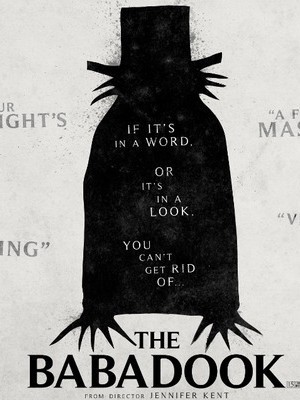
This might be my favorite on the entire list, so I'm gonna stick it right here at the top. But really, if there's one movie on this list that you should watch, it's the Babadook. Sure, you might have to suspend your disbelief on a few occasions, but it's totally worth it. It seems so rare that horror movies transcend their linear plots into something deeper, but the Babadook succeeds to descend to wonderfully cerebral depths. Without spoiling too much, the plot centers around a mother, grieving the loss of her husband, and her ADHD trouble-child, who come across a creepy kids’ book. An emotional and psychological haunting ensues that dares viewers to venture into the realms of depression and mania.
Let the Right One In - 2008 [TRAILER]
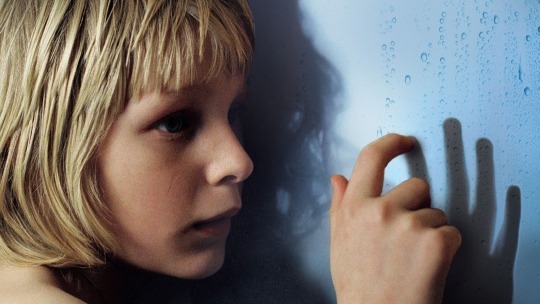
I've been bored of Vampires since Harry Potter, but this little charmer bit me right in the jugular. The plot centers around a boy who befriends a young female vampire—and yes, for you vampire loving people out there, it does get kind of romancy (in that innocent kid way). Apart from the totally on-point acting, the film maintains an oddly delicate balance of emotional tenderness and intimacy to total blood-chugging brutality. It is easily the best vampire movie to date, and if Swedish subs aren't your thing, there's an American version, Let Me In, that is equally as good.
It Follows - 2015 [TRAILER]
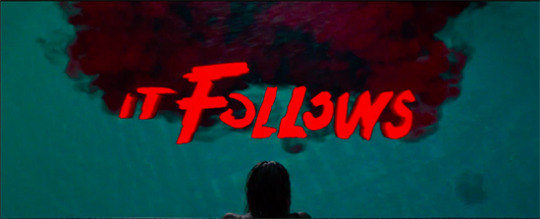
With one of the most original plots I've ever experienced in a horror movie, It Follows is being touted as one of the best movies of 2015. It's a film best left to experience without outside influence, but I can say that this film will be well enjoyed by those who appreciate speculation, interpretation, and subplots involving the exchange of STDs. It follows tread along a straight forward plot, but contains a wonderful amount of depth to sift through afterward. The film also has top-notch acting and is beautifully shot (much of it shot in Detroit). Make sure you see it with a few friends so you can talk about it afterward!
The Orphanage - 2007 [TRAILER]
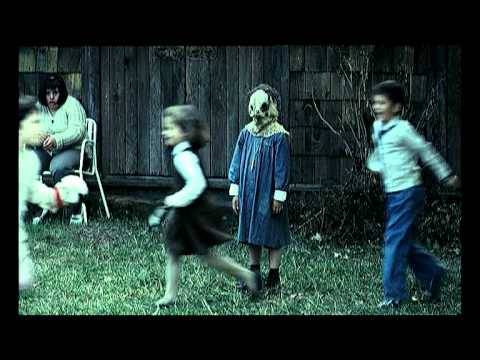
I love me a sad, creepy ghost story, and there's something even better about them when they involve dead children. Like many of the films on my list, The Orphanage, produced by Guillermo Del Toro, has just that. But in all seriousness, this film has a wonderfully emotional story that’s rarely found in the horror genre. It's a well-known classic amid fans of the horror genre, a film that masterfully builds writhing tension to evoke its scares.
Lake Mungo - 2008 [TRAILER]

Lake Mungo offers a long-winded but mature examination of loss and grief. Its presentation is almost dreamlike, with a plot that focuses on the horrors experienced by a family after the drowning of their daughter. Lake Mungo exceeds as a film in the way that it relentlessly builds upon a wrenching sense of dread. Made with a tiny budget, but supported by solid acting, this film is surprisingly believable and captures the vulnerability, isolation, and confusion experienced after the unexpected death of a loved one. Simply put, this movie is completely terrifying, yet contains almost no cheap scares. It's a 100% unrelenting, slow-roast dread that doesn't let up until well after the credits.
REC - 2007 [TRAILER]

The original REC is a deliberately fast-paced film that sandwiches its doomed characters between compounding layers of dread, resulting in of one of the best modern horror films in years. The pseudo-zombie plot derails right from the get-go, and later smashes into the supernatural for a terrifying climax. But the disgusting monster at the end? That takes the cake for one of nastiest creepers ever to make it into cinema.
The Curse (Noroi) - 2005 [TRAILER]
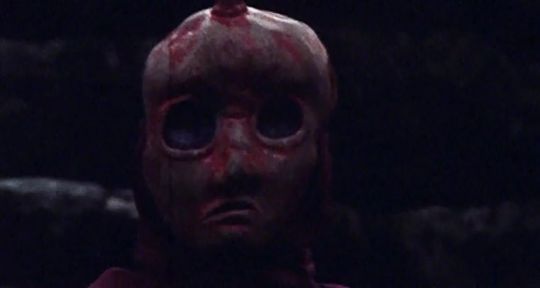
There is a goldmine of Eastern horror out there, and the Curse represents the genre as one of the best. It's a Japanese, low budget, faux documentary, that—amid scenes of complete ridiculousness—manages to be completely and dreadfully effective. Noroi presents an engrossing, slow-burn mystery that carefully leaks the details of an ancient demon-curse. If you're interested in venturing into classic eastern horror, definitely check this one out.
Kill List - 2011 [TRAILER]

In some ways, Kill List tries to be a deep character study (and I'd say for the first 45 minutes, this might hold true), but then it’s quickly upstaged by an eerie crime drama, which later transforms into a totally effed cult-terror-gore-fest. Somehow, it all seems to work together, leaving you with a disturbing, yet surprisingly thought-provoking mess to discuss with your friends. This is a film to be viewed with others, and I highly recommend it for those who love cults, mysteries, and gore.
28 Days Later - 2002 [TRAILER]

While I wanted to avoid the obvious choices for this list, I couldn't leave out 28 Days Later, because...Well, it's just too good to ignore. With fast zombies, sympathetic characters, and incredible production, Danny Boyle has created one of the best pieces of apocalyptic horror ever made. You’ve probably already seen it, so you might as well see it again.
The Descent - 2005 [TRAILER]

The Descent stars six women, all part of an extreme adventure club, who decide to explore the creepiest cave in the entire world. In this cave, of course, dwell terrible, fanged, amphibious slime creatures who have an affinity for jump scares and standing directly behind the backs of the characters...but the real horror of this movie is the cave. The movie absolutely excels in conveying intense desperation and suffocating claustrophobia. Despite solid reviews, I had low hopes for this movie, but ended up really enjoying it. Highly recommended.
Cabin in the Woods - 2012 [TRAILER]

Horror fans tout Cabin in the Woods as a modern classic. Is it particularly scary? No. But it does provide an ample serving of self-aware humor and cliche-bending twists. I don't care much for self-aware horror movies, but Cabin in the Woods does it right, offering one of the best works of pop culture entertainment that the horror genre has ever seen.
Suicide Club - 2002 [TRAILER]

With an opening scene of 50+ Japanese schoolgirls jumping in front of a train, I can confidently say that Suicide Club is one of the most hardcore horror movies of all time. The movie follows a wave of unexplained suicides and slowly pieces together a rather nebulous mystery. Answers, however, are few and far between, and I am still not sure if I actually like this movie. But for anyone who is looking for something a little bit darker, this is for you.
Battle Royale - 2000 [TRAILER]
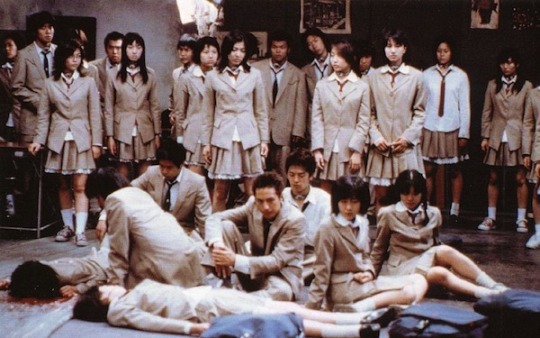
Before the Hunger Games, there was Battle Royale, which happens to be set in a similar dystopian universe, wrought with unemployment, crime, and malcontent. Each year, a randomly selected 9th grade class of Japanese, khaki-donning schoolchildren are outfitted with exploding shock collars and given an assortment of weapons. They are then forced to hunt each other down until there is only one left. Long story short, it's the hunger games with an R rating, and if I am not mistaken, this controversial child-massacre-gore fest was banned for a time. But for real, this movie rules, topping its big-budget, modern successor with tons of style, as well as a healthy dose of dark, humorous cynicism. If you felt that the Hunger Games didn’t have enough teen gore, then this movie is for you.
The Devil’s Backbone - 2001 [TRAILER]

A haunting allegory of the Spanish Civil War, Guillermo Del Toro's film presents a chilling school house ghost story that stands as a masterfully produced piece of cinema. It's heavily atmospheric, emotionally fraught, and above all else, spooky. This fable is one of Del Toro's best and is a must watch on this list.
Creep - 2015 [TRAILER]

Laced in dry humor, Creep is another slow burner that masterfully builds upon a foundation of discomfort and creeping uneasiness that relies little on jump scares (although, it does not forgo them). The two fold script prompts some of the best acting on this list - and rumors state that much of it was improvised. Creep is proof that you don't need to have a big budget with CGI jump scares to make a compelling horror movie. Did I mention that it's available for Netflix streaming, too?
Gerald's Game (89% RT) [TRAILER]

The plot begins with a dude named Gerald, who, with his wife, depart to an ocean side cabin for a sexy-time retreat. Except their sexy time, in typical Stephen King fashion, goes horribly wrong. Next thing you know, Gerald is being eaten by a dog and she's handcuffed to the bed and then the boogieman starts to come out at night. Hopefully I didn't just ruin the movie for you, but for real, it gets really good - and the boogieman is one of the best horror spooks I've seen in a long time. The wife, Carla Gugino, gives nothing short of a stellar performance, too.
The Witch (91% RT) [TRAILER]

The Witch centers itself around a (Puritan?) family who is banished to the outskirts of the New England wilderness in the 1600s (where an ancient and foreboding evil lurks). Shortly after, the crops die, people get possessed, someone's nipple is eaten by a demon crow, and Satan appears as the family goat, named "Black Philip." Despite what I just said, the Witch bares little, but what it does reveal is absolutely brutal. But the real horror is not what hides in the woods, but rather the evil that makes its way inside of the characters. Overall, it's an exceptionally well made period piece that will marinade you in dread... and thus the Witch is one of my favorite horror movies of all time.
Under the Shadow (99%) [TRAILER]

Under the Shadow is an art house masterpiece that serves as one of the greatest horror movies ever made, yet it is mostly unknown outside of horror circles. The movie is about an Iranian mother and daughter, living in a bombed out Tehran in the middle of the Iran-Iraq war. Her Husband, a doctor, is drafted to serve at the war front and they are left behind when an undetonated missile comes crashing into their apartment building (followed by a superstitious neighbor spouting about how the missile brought with it a middle eastern demon, or Djinn). Things start to get creepy when random items being to go missing, the daughter's behavior becomes increasingly erratic, and the Mother is plagued by horrible nightmares. But most unnerving of all is the isolation and desperation of a mother and daughter trapped in urban chaos.
IT (86% RT) [TRAILER]
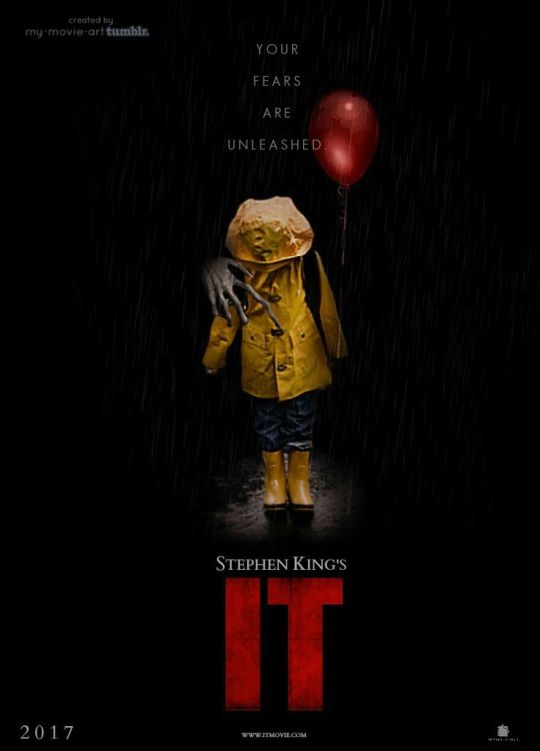
An ancient, child devouring evil lurks under the town of Derry, Maine, who manifests itself physically as the apex of one's fears. Over the centuries, It has developed a taste for children (whose fears are easier to conceptualize, apparently), and thus It's preferred manifestation is that of a google-eyed, drooling, and mildly pedaphilic clown named Pennywise. Without drenching this write-up with my slobbering love for this movie, please know that the director and actors absolutely nailed it. The book presents 1200+ pages of historical world building with time-jumping plot lines - and the movie does an amazing job portraying the phantasmagoric and fantastical, yet demon-beleaguered town of Derry. Director, Andres Muschietti and co. deserve every penny of the 300 million dollars it has grossed since release.
It Comes at Night (89% RT) [TRAILER]

It Comes at Night is a psychological slow-burner, relying on the fears of the unknown, of mistrust, and of post-apocalyptic desperation. The plot revolves around the plight of a family, isolated and hidden, in their forest home as an undefined and unnatural blight ravages the outside world. One day, another destitute family comes stumbling into their home, who are cautiously taken in. Paranoia and mistrust slowly begin to boil between the two families, awakening an evil greater than the zombie-esque disease they seek to hide from. It's an unnervingly fantastic film that will stick with you long after viewing.
Get Out (99%) [TRAILER]
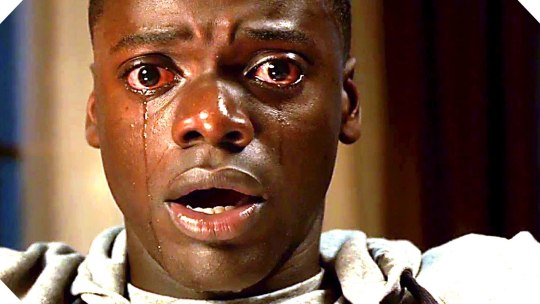
You can't have a “best of horror” list without mentioning "Get Out." The plot, which involves a bi-racial couple making a visit to the girlfriend's (white) parent's house, is both sharp and nimble in its often satirical portrayal of racial tension. The over-the-top plot initially focuses on a particularly awkward form of racial envy, which quickly derails into something much more sadistic - all the while tinged with director Jordan Peele's trademark humor. It is a movie that gives hope to the genre and has absolutely cemented itself as one of the best horror flicks ever made.
Train the Busan (95%) [TRAILER]
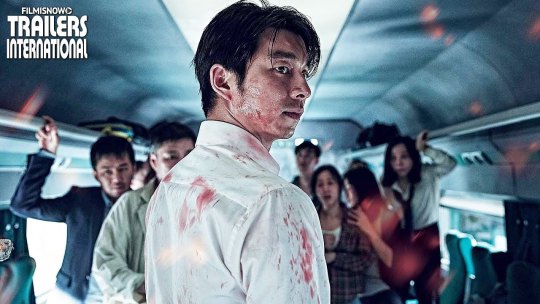
A father and daughter find themselves fleeing through the countryside (via train) amidst a zombie apocalypse. It's predictable, gory, and over-the-top, but in our cinematic world, over-peppered with every kind of zombie flick conceivable, Train to Busan still explores nuances amidst its campy and relentless action. Simply put, "Train to Busan" is a well-made and exceptionally entertaining film that still offers a dose of originality from within its South Korean setting. Just try not to take it too seriously.
The Wailing (99%) [TRAILER]
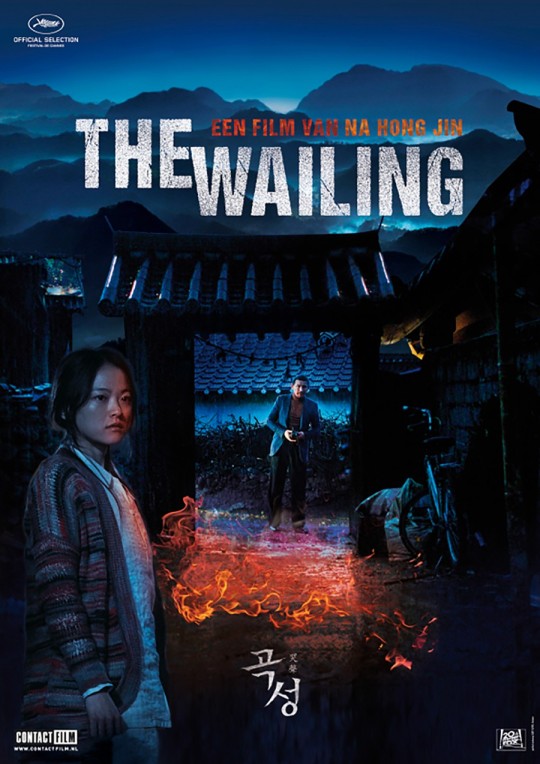
In a quiet south Korean village, a strange visitor appears, and soon after people start violently killing each other. In a panicked desperation, the police consult the occult to aid in solving the mythical blight that threats to spread beyond the village's outskirts. The Wailing is best enjoyed without knowing too much, but this phantasmagoric and gritty film is a cemented gem of Korean horror. It has some flaws and is exceptionally long, but the exploration of creepy eastern cult-mythology makes it well worth the trek.
The Banshee Chapter (75% RT) [TRAILER]
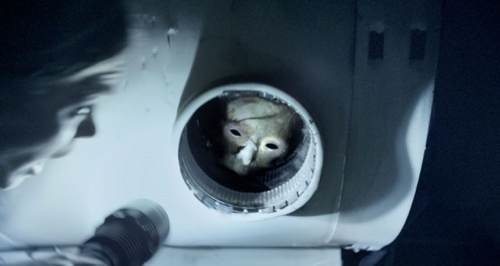
A man goes missing after consuming some CIA branded psychedelic research chemicals - and his friend decides (with the help of a gonzo-inspired journalist) that she’s going to track him down. They acquire the aforementioned chemicals and proceed to smoke them, which apparently allows an evil deity to invade their lives (this particular deity takes the spooky meter and sends it to level 10). The plot is, admittedly, pretty lame, but if you can embrace the campiness, you'll find the movie is legitimately terrifying. I was prepared for a b-movie cheese fest, but for real, this movie is exceptionally spooky.
Hell House (76%) [TRAILER]

A malfunction occurs in an Halloween attraction set on the site of a hotel with a nefarious past, causing the death of 15 people. A half decade later, a documentary crew decides to investigate the tragedy and end up acquiring some tapes of the incident. It's a bit cheesy, but the plot and the acting are pretty damn good for a straight-to-VOD, found footage B-movie. Most importantly, though, is that "Hell House" is extraordinary creepy; completely worth watching for the thrill of horror.
Hereditary (89% RT) [TRAILER]
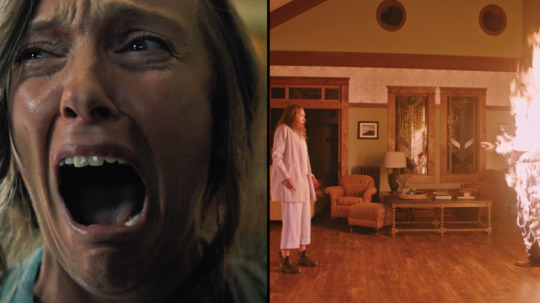
Cemented by Toni Collette’s wonderful performance, Hereditary is easily the best horror movie of 2018. The movie presents one menacing sucker punch after another as it rips apart the ground beneath the security of home. Both devastating and anything-but-subtle, Hereditary is recommended to those who like ancient demons, candle lit seances, and the occult.
A Quiet Place (95% RT) [TRAILER]
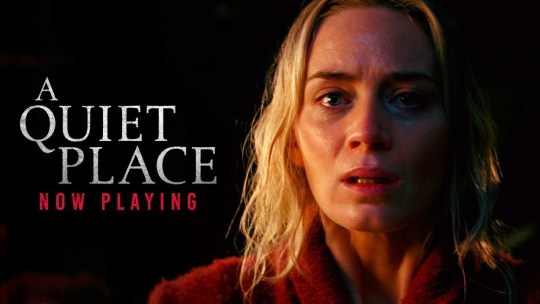
A Quiet Place’s plot, both affecting and inventive, throbs with (at times) agonizing, hold-your-breath tension. At the core you will find a family of four, struggling to survive in a world inhabited by invasive, sound-sensitive creatures who would prefer the extinction of humans. John Krasinski serves as both director and acting lead, which is good news for those of us who could care less for the recent stream of superfluous action movies he’s been producing.
A Dark Song (91% RT) [TRAILER]
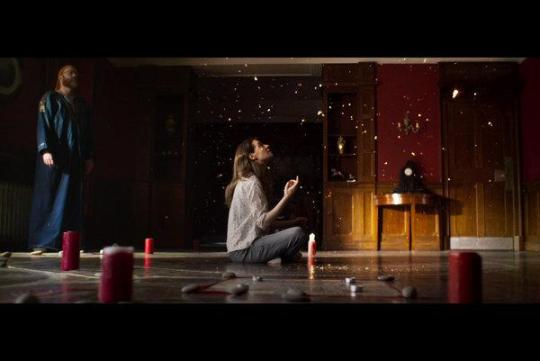
Brooding and methodical, A Dark Song is set-piece pagan horror at its finest. It features only two characters: A mother in mourning and an arrogant occultist whom she seeks the aid of. The duo lock themselves in an old mansion to enact a lengthy and risky ritual, one that (ideally) results in a wish being granted. The acting is both fantastic and believable as the characters, in typical horror movie fashion, make mistakes that send them into a descent of madness. It’s witchcraft-gone-wrong; a slow burner with the relentless dread and chaos of a waking nightmare. This is one of my all time favorite indie horror movies. Highly recommended.
1922 (89% RT) [TRAILER]
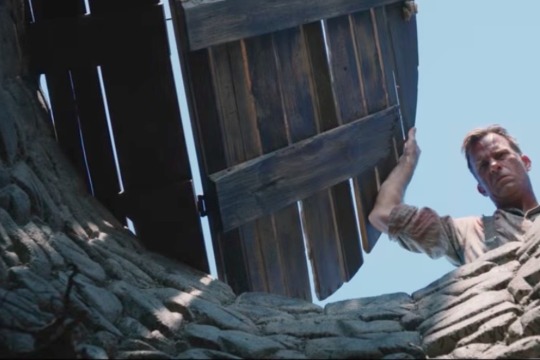
Unreliably narrated via the confession of a father who murders his wife (and who also ropes his hesitant son into the act), 1922 is a brooding tale of a man driven to madness by way of guilt. There are no jump scares to be found, as the movie favors the father’s slow-rot suffering and his futile and increasingly desperate attempts to bury his festering guilt. Psychological horror at its finest, this King adaptation is another excellent addition to Netflix’s diverse and original collection of horror movies.
The Ritual (71%) [TRAILER]

While imperfect at best, this B-movie, set in northern Sweden, provides an interesting set (creepy, frost-dusted hinterlands) inhabited by four bros and an imaginative monster who’d prefer they were hiking somewhere else. Ankles are sprained and tempers swell as the friends become increasingly lost amidst a forest of their misjudgment. This movie is the definition of “pretty decent” with enough substance to hopefully see you through to the “less than decent” finale.
7 notes
·
View notes